
In the following section you will find a more in depth examination of each propaganda technique. The layout below is similar to
the popup viewed by clicking "TECHNIQUES" on the home page or by clicking the pearl in the single player game. However, the text that
appears below offers a more thorough analysis for those who we call Oracles who wish to dig even deeper and
attain more clarity and resolution. These insights were made possible by George Henry Moulds in his book
"Thinking Straighter."
*Scroll down, choose a technique or section, and then read its description below.
All Sections & Techniques:
| Self Deception | Language | Irrelevance | Exploitation | Form | Maneuver |
|---|---|---|---|---|---|
| Prejudice | Emotional Terms | Appearance | Appeal to Pity | Concurrency | Diversion |
| Academic Detachment | Metaphor and Simile | Manner | Appeal to Flattery | Post Hoc | Disproving a Minor Point |
| Drawing the Line | Emphasis | Degrees and Titles | Appeal to Ridicule | Selected Instances | Ad Hominem |
| Not Drawing the Line | Quotations Out of Context | Numbers | Appeal to Prestige | Hasty Generalization | Appeal to Ignorance |
| Conservatism/ Radicalism/Moderatism |
Abstract Terms | Status | Appeal to Prejudice | Faulty Analogy | Leading Question |
| Rationalization | Vagueness | Repetition | Bargain Appeal | Composition | Complex Question |
| Wishful Thinking | Ambiguity | Slogans | Folksy Appeal | Division | Inconsequent Argument |
| Tabloid Thinking | Shift of Meaning | Technical Jargon | Join the Bandwagon Appeal | Non Sequitur | Attacking a Strawman |
| Casual Oversimplification | - | Sophistical Formula | Practical Consequences | - | Victory by Definition |
| Inconceivability | - | - | From the Acceptable to the Dubious | - | Begging the Question |
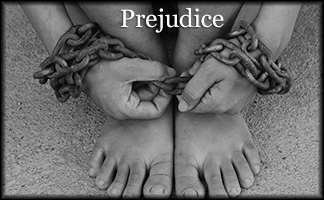
MEANING: A prejudice is an unwillingness to examine fairly the evidence and reasoning in behalf of the person or thing which is the object of the prejudice. It is a prejudgment caused by indoctrination, conditioning, or some prior experience of a singularly pleasant or unpleasant character. A prejudice has strong and deep emotional support.
EXAMPLE: Nathanael asked (referring to Jesus): "Can anything good come out of Nazareth?" and thus indicated his prejudice against Jesus' home town.
We have already said (see our discussion of Appeal to Prejudice) that a prejudice is a prejudgment (pro or con), a belief held independent of -- or despite -- facts. Such relevant facts as are perceived are distorted because Prejudice warps our mental eyeglasses. In discussing prejudice at this new juncture we are not now talking of appeals to known prejudices. These are made from without, as by an advertising man, a salesman, or a politician. Rather, our current interest is in how you may become the victim of your own Prejudice.
What would be the feelings of the men if a legitimate survey indicated that women drivers were superior to men? Or, if the claim were substantiated that women are lazier than men, how many women would look into the details before feeling insulted and rejecting the claims without further thought? Would not most Republicans at a public gathering applaud when something obviously untrue but laudatory was said about the Republican party?
Most people listen solely to the speeches of candidates whom they have already decided — on non-rational grounds -- to support. They listen to those political analysts and commentators who "aren't afraid to tell the truth" (meaning "think as I do") rather than expose themselves to any contrary view. When forced to do so, they shut their minds; and if they cannot or do not shut their minds, they become disturbed but pride themselves on emerging with their conviction still intact.
There are both Protestants who will read nothing if it has a Catholic flavor; and Catholics nothing if it savors of the heresy of Protestantism. And then there are the young sophisticates who disbelieve anything if it sounds "religious."
Prejudice differs from Hasty Generalization in that although Hasty Generalization often rep-resents a spontaneous emotional reaction, Prejudice is always a matter of much longer standing. The feeling that operates in the latter case is deep, not superficial, and is often completely hidden from the man in its grip.
The emotions that determine present action may be the sort that only a psychiatrist could uncover. A grown man may give clear indication of his resistance to authority. He always favors rebels and revolutionaries. Such a predisposition may be traceable to the forgotten harsh discipline of his father and his consequent resentment, but the connection is completely concealed from him. He may spin an elaborate logical defense of his championing of such people and to his way of thinking his action is wholly rational.
Mrs. Jones will not shop at a certain store in town no matter how attractive their prices or merchandise. She positively will not set foot in that place again. Perhaps by now she has completely forgotten what originated the Prejudice. It was only a trivial incident but involved her feelings. She dropped a bottle of bleach in the supermarket. It broke, damaging some of the merchandise and making a mess on the floor. The assistant store manager told her she must pay for the bleach and she was indignant. Today she will tell you that she stopped going there because she couldn't seem to find bargains there anymore.
Being a scientist does not protect you against all Prejudice. What is needed is a willingness to apply the scientific attitude to problems outside the narrow field of your technical specialty. Hatred of the Jews reached its high-water mark among a people far advanced in technical science — the Germans of the 1930's and 40's.
Of course people like to think of themselves as unprejudiced, but the facts are that all of us are more or less prejudiced. That is true because we are involved in groups, some of rather long standing; but we all need to be on guard against the blind loyalty that assumes that the interests or likes of our group(s) are superior to all rival interests. Since Prejudice is a universal tendency of human nature, we must combat it persistently.

MEANING: An emotional term is a word or phrase which, however much factual information it conveys about an object, also expresses and/or arouses a feeling for or against that object. The fallacious use of emotional terms occurs in controversial situations.
EXAMPLE: Participant in argument: “If you damned fools would only shut your traps a while and let me...."
Emotionally charged language is appropriate, in some cases positively laudable, in
1. non-controversial situations, e.g. , patriotic celebrations or church services;
2. poetry and other literary forms;
3. expressions of personal feeling with no attempt to persuade or convince others to accept your position.
In all these areas of communication we appreciate the speaker or writer who consciously and skillfully chooses his words for their emotive impact.
Nevertheless, Emotional Terms is perhaps the commonest of fallacies and the one that works the greatest havoc in human relations. Brutal struggles, between men and between nations, stem from its use.
Emotionally charged words are always harmful when we are trying to think accurately on a disputed point of fact. Here we need explanation, not inflammation, light not heat. Such words not only indicate an object but also suggest an attitude to be taken toward it. And when our attitude is one of strong feeling or emotion it is difficult to think clearly.
All of us like to think that we are logical, but if we give ourselves a thorough appraisal, we will readily admit that it is easy for a few well-chosen words to predispose us and make us partial to a cause about which we know nothing. Some public speakers have a marvelous ability to choose the right words to arouse enthusiasm for everything they want to sponsor and antipathy for every-thing they wish to oppose. If a speaker wishes to turn an audience against a Russian, or for that matter any citizen of any country, he has only to call him a "Red."
The effect of an emotional term is to ascribe to a person, object, situation or event a quality which will arouse a favorable or unfavorable attitude or response although this quality is not inherent in what has been praised or condemned. It is rather a projection of the subjective feeling of the speaker or writer. If he acknowledged as much, tempers would be much cooler.
Bertrand Russell is reported to have declined the adjective "obstinate" in this manner: "I am firm," "You are obstinate," "He is pig-headed." Now "pigheadedness" equals "following a course of action and refusing to be influenced by other people's opinions" plus "I don't like this behavior." But "firmness" means "following a course of action and refusing to be influenced by other people's opinions" plus "I like this behavior."
If you say that you like Jones' obstinacy and I acknowledge his obstinacy but say I dislike it, we may have laid the grounds for quarrel but we have also made it possible for each to go his way peacefully thinking the other is entitled to his personal feelings. However, if I were to use the term "pig-headed," you would feel under some constraint to do something (probably rash) to clear Jones' name.
"Administrator," "bureaucrat," "public servant" have much the same objective meaning: all three may indicate someone who holds a government administrative position, yet the first of the terms is neutral (objective or scientific), the second abusive, and the third honorific. A man may "talk eloquently" or "jabber." A senator may have "the gift of compromise" or be a "slippery customer." A woman says of a friend that she is "understandably confused" but refers to an enemy as being "a bit off her rocker."
You will find 'it a very interesting exercise to take any emotionally-neutral, objective term, such as "child," and try to find in English its emotionally-positive and emotionally-negative equivalents. An equally entertaining (and even more profitable) exercise is to take any emotionally charged passage that you come across in your reading of argumentative material and attempt to translate the passage into neutral language. When you do so, you will find that what once seemed to be an earth-shaking piece of information is after all something that can easily be taken in stride. Taking the example with which we started our discussion, it translates into "I don't agree and if you'll just give me a chance to talk, I'll show you why."
Our lives are filled with practical situations where we must make responsible and highly important decisions. Who will get our vote? Should the federal government nationalize the rail-roads? Should the government inaugurate a system of compulsory health insurance? Should capital punishment be abolished in our state? Should our community build another school? Should my wife and I build or buy a new home? What are the arguments pro and con? What are the facts that are relevant to a decision one way or another ? Clearly the scientific type of thinking and objective language are required. Emotional terms distract from a careful study of the issue; they lead us to conclusions that in our calmer moments we must disown. The-man who is angered by negative emotional terms is apt to reason poorly; so also the man who is flattered by positive emotional terms.
There are emotional terms in much advertising. The chain store advertises brands of its own manufacture or at least of its own labeling as "private" brands. These are called "off" brands by the small independent retailer. New housing developments rising out of a cornfield are named in a way to seize upon your emotions: "Strawberry Hill," "Golden West," "-Riviera Estates. Instead of presenting the potential buyer with reasons why he should buy this brand instead of that, much of modern advertising prefers to present the company's name, trademark, brand name, and/or product together with visual and/or auditory material which may be wholly irrelevant but which nevertheless can be depended upon to arouse pleasant feelings in the reader or hearer. Thus a "favorable product image" is built up and the customer is emotionally preconditioned to act in the advertiser's interest.
But, it may be objected, mustn't we ever lose our temper? Can't truth be best served some-times by frankly emotive language? If my opponent is a fool, a liar, and a coward, why shouldn't I say so? It is impossible to avoid the use of emotional terms, or expressions of approval and disapproval, when making ethical, aesthetic, or any value judgment, but these should be supported by factual evidence or logical reasoning. "That salesman pulled a dirty trick because he concealed from the buyer the defects of the product." "This is a beautiful picture because it has such a pleasing pattern of color, line, and texture." Such a way of speaking provides opportunity for comparison of evidence and reasoning.
Certainly the truth on occasion may best be served by frankly emotive language. But that is to assume that we have the truth. If we are engaged in discussion aimed at arriving at the truth, we had better keep our tempers. Assuming proof that your opponent is a liar, there may be a virtue in calling him such. There is no single term available that is more neutral. Just do not call him a "damned liar."
While we will allow to one who thinks that he has the truth the right to mount to lyrical heights in expounding it, our counsel to him who listens is still, "Look out, for the 'truth' may be only a seeming one."
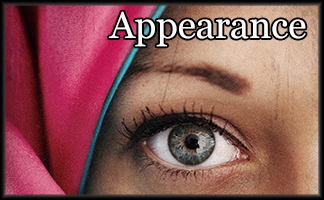
MEANING: The appearance of a thing (or person) is made the basis of our acceptance or rejection without any thought that this appearance may be a deceptive indicator of value.
EXAMPLE: A floor wax nationally advertised on television is shown in the commercial being applied to a floor with the immediate result of a brilliant lustre. The viewer does not know that the floor had been buffed and polished for days, and then dust coated just before the wax was applied in the commercial.
The fallacy of Appearance is as widespread as any. Its ramifications extend into all human affairs. Early in life we learn that "appearances are deceiving." But we never learn the extent of this deception or the myriad heads under which it occurs. So to our continuing sorrow we re-learn the lesson time and again. Some of us profit more than others from these lessons of experience. Really there is but one lesson to be learned and it is this: Never, unless you are buying for mere appearance, let Appearance (especially first appearance) bias your mind for or against something.
A man who buys books only for their appearance on his library shelves will, of course, look no deeper than external appearance -- though even he would be "well-advised to question how long these covers will hold their present attractiveness. But we who buy novels for their contents would be well advised to dismiss the colorful dust jackets, often portraying scenes of violence and lust, as so much eyewash.
When we are deceived by appearances, it is often enough quite innocently done. Those people who are naturally attractive in appearance are not necessarily consciously exploiting this "personal asset." And what the well-dressed, neat-looking, and handsome salesman has to sell may be well worth the money and exactly what we need. But it remains true that to the extent that we let his appearance inspire confidence in him and his merchandise we are acting irrationally.
But of course, our primary concern is about the unscrupulous connivers who work on our weakness for Appearance to sell us the shoddy or worthless. Through the years laws have been passed to prevent this or that deceit that happens to have caught the public's attention. But laws can never keep up with the ingenuity of the unprincipled. And it may be questioned whether the passing of laws is the best solution of the problem.
It remains as true as ever that you must, as the Better Business Bureau's slogan insists, "Investigate Before You Invest." It would no doubt be a happier world if we didn't have to operate on the assumption that "nothing may be what it seems to be." But in our present world there are highly trained experts with highly specialized tools in the business of manipulating other people by making things seem to be what they are not.
The uses of the camera in the art of deception would alone fill a book. "The camera never lies, but liars use cameras." Perhaps the classic example is the sale of Florida real estate to northern buyers sight unseen -- except for newspaper photographs of your ocean-side building lot. The trouble was: the pictures were taken when the tide was out. When the tide came in, the appearance of your real estate was startlingly different.
We are not deprecating good appearance as such. It is natural to be concerned about one's appearance. It is commendable to regularly maintain a pleasing appearance -- pleasing to oneself and to others. There are aesthetic values and life is made richer for us when people and products embody them. But appearance is only one value and no substitute for the essentials of human character and the basic utilities of human products.
A special case of the fallacy of Appearance is the deceptiveness of numbers, i. e. , they are not always what they look to be. Why is it that if someone has a property to sell and would like $25, 000 for it, he advertises at $24, 990? People who are in the market for a new home may have drawn the line at $24, 000. Seeing a figure of $25, 000, they do not give the advertisement a second look. But the $24, 990 is, at first glance, in the $24, 000 bracket. The seller is willing to give up $10 in exchange for greater interest and more inquiries. Then there is the odd weight gimmick. In looking over the package the customer sees that it contains "6 7/8 ounces"; too many customers think "half pound."
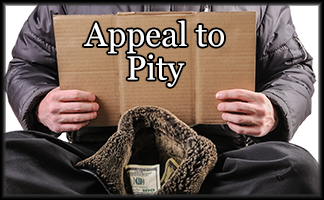
MEANING: An attempt is made to secure our commitment by presenting the object of commitment as an object of sympathy, thereby arousing our sympathetic feelings to the point where these feelings determine favorable action.
EXAMPLE: Student to professor: "I know that my test grades have been poor and that I deserve an 'F,' but my father is in the hospital and it will just break his heart if I get an 'F' in this course."
There are a number of human emotions that may be enlisted in support of this or that alter-native of action. Most people are more or less capable of sympathy. Quite a few people are very quick to sympathize with the plight or alleged plight of others. In Appeal to Pity this emotional susceptibility is being exploited by someone.
There is a legitimacy about an appeal to pity, just as there is a legitimacy about any appeal to the deep humanity of men. Because of the universality of the response, it is too often taken advantage of by rascals. One of the most difficult things in this day is to know when to be charitable. We cannot trust all who appeal to our charity.
We are familiar enough perhaps with the "blind" panhandlers who perhaps can see better than we, the "crippled" door-to-door salesman who walks well enough when out of sight. But the limits to which this deception may go are fantastic. Changing Times reports the following advertisement as appearing in the Washington (D.C. ) Evening Star and giving a local box number as address:
SALESMEN REPORT sales double when wearing our simulated hearing aid. Gives you that real pitiful look that makes prospects want to help. Fits comfortably, looks like real thing. Double your sales in 2 weeks or refund. $2.00. Also available simulated polio equipment.
The same Appeal to Pity is used by the advertiser who says that for one week only he will turn over 5% of the store's profits to the Children's Home or to some other worthy charitable institution. It has commonly been thought to be a principle of capitalism that goods should be sold on their own merits, not on the merits or plight of the salesman.
Most people do not know that charity itself has become a profit-making business. There are people whose business it is to offer their services -- for a fee -- to any organization desiring to raise money by a public appeal for donations. Since these promoters receive their reimbursement first, it may happen that all the money raised goes to them and that not one single charity dollar goes to benefit a needy person.
Americans, for a variety of reasons, give several billions a year to philanthropies. It is estimated that one hundred to two hundred million of this goes to out-and-out frauds. A much larger sum goes to poorly managed organizations that waste their resources and spend your charity dollar where it does the least good. One investigator discovered that the National Kids' Day Foundation collected $3, 978, 000 in five years, 82% of which was expended on solicitation costs, professional promoters' fees, promotional material and office upkeep. A man in Detroit sent out dollar bills and asked that the bill be sent back with an accompanying dollar bill for a cancer hospital. He ran his original $2, 000 up to $630, 000. There was no such hospital.
You should also know that once your name appears in print as a substantial donor to this or that cause, that name will probably appear on one or more of the "sucker" lists that are the prized properties of the professional fund-raisers.
Our concern is not merely with the charity racketeers who prey on American generosity. The Appeal to Pity knows no limits in its applications. Since it is commonly believed that women are more prone to pity, a defense attorney addressing a jury composed largely of women will make the most of the fact that the defendant has a wife and seven small children dependent on him. How could anyone be so hardhearted as to find him guilty and send him to jail?
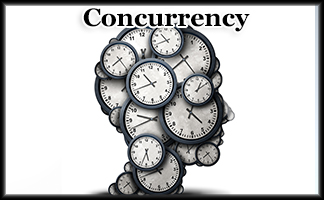
MEANING: Because things exist or appear simultaneously, it is claimed that one is the cause of the other. The form of the argument is: A is present along with B; therefore A is the cause of B.
EXAMPLE: "Who was President at the time of World. War I? Wilson, a Democrat. Who was President at the time of World War II? Roosevelt, a Democrat. Who was President at the time of the Korean "War"? Truman, a Democrat. Obviously, the Democratic party is the war party."
Two concurrents could never be cause of one another. A cause is something antecedent in time. If Wilson was President at the time of World. War I, he could hardly have been the cause of the war -- at least in that role; in order to cause the war he would have had to have been President, or active in some other capacity, before the war.
An interesting application of this fallacy in politics occurs when the present (say Republican) administration secures the passage of laws, the effects of which will not show up for some years. Meanwhile the Democrats are voted into office. And then the effects begin to show up in due time. If good, the Democrats will say, "Look who's here!" and take the credit to themselves; if bad, the Republicans will say, "Look who's there!" and take the discredit off themselves. In any organization the man presently in office takes the blame or credit for consequences resulting from the acts of his predecessor.
This same fallacy of Concurrency is found in the advertisements that picture a pretty girl and attribute her peaches-and-cream complexion to the cold cream that she happens to be currently using. The truth of the matter might be that she is still pretty despite the stuff she smears on her face every night.
The concurrent factors held to be causally related may be dynamic in character. But again, because factor X grows or declines along with the growth or decline of Y, X is said to be the cause of Y. Those who favor prohibition point to the fact that consumption of liquor has gone up in recent years and so has the number of auto accidents. From this fact, the conclusion -- to them -- is obvious. But it could as well -- from this fact alone -- be argued that auto accidents are the cause of consumption of liquor as that consumption of liquor is the cause of accidents. The truth may be that the two phenomena are wholly or partially unrelated. In short, Concurrency proves nothing.
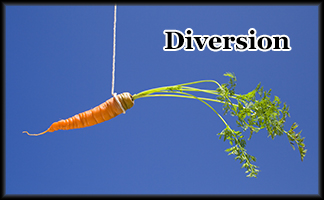
MEANING: To divert is to get off the subject. With the original issue left unresolved, one of the disputants begins to talk of something which has no apparent evidential value for his thesis. The diversion is full (instead of merely partial) when the second party to the argument "accepts" the diversion and joins in discussion or argument over the new issue.
EXAMPLE: Jones: "I think that American industry should be run on a profit-sharing basis."
Smith: "Really! I don't think so. I don't see any obligation on the part of owners to share profits with their employees."
Jones: "Profit-sharing will provide the worker with greater incentive."
Smith: "Workers don't need more incentive. They need higher wages. I remember the wages I got as a boy, working in the bean fields. They were pitifully low."
Jones: "Yes, they were. I remember those bean-picking days well. As I recall, Smith, you were the best picker in the field."
Smith: "No, Jones, I beg to differ. You were the best picker."
In the example given Jones is guilty of a Diversion. There is no apparent connection between who was the best bean-picker and the desirability of profit-sharing. Smith accepts or "falls for" the Diversion by showing his willingness to argue the question of best bean-picker. The Diversion thus becomes full or complete.
Study a set of correspondence, perhaps a series of letters to the editor of the local news-paper. Jones writes a letter to the editor. Smith answers Jones; Jones answers Smith, etc. Nearly every such controversy that is started is not carried to a conclusion because one side or the other creates a Diversion in the second or third letter. Next time do not participate but rather listen to the arguments of the home, the dormitory, the street. Note how soon a Diversion is created. A discussion as to whether our diplomacy has failed in Europe may at length reduce to an acrimonious squabble over the personal character, or lack of it, of the present resident of the White House.
"Stick to the point" is an old and honorable imperative, but human nature seems to be other-wise constituted. The disputants who can stick to the point are rather the exception. The irrationality of arguing two questions at the same time or of arguing a second question without having agreed on the disposition of the first question is obvious.
Sometimes Diversion is deliberate, more often innocent. When deliberate, the diverter realizes the shakiness of his position on the original issue and revives his ego by diverting to another issue on which he can take the better or stronger side. He may even hope to leave the impression with any hearers or readers that he has won the original argument. The lack of alertness of the average audience is conducive to such an outcome. Most people listen with "half an ear." And if you should attempt to drag the diverter back to the original point, you may find your-self in an, even worse position, for he may loudly assert that you are trying to evade his arguments. Diversions function by making the audience forget the point or become unwilling to consider it. After a successful Diversion, the audience may find it tedious to get back to business. To be sure, audiences generally do have a sense of fair play which demands that individuals be given a hearing, and people may resent a Diversion if they recognize. it as such; so sometimes it is effective to expose a Diversion and ,then appeal for orderly discussion.

MEANING: We refuse to commit ourselves when decision or action is demanded. In a controversial situation requiring a stand to be taken, we see (or think we see) persuasive arguments on both sides. But certain situations, e.g., voting, require decision and action of one kind or another. Here, instead of trying to remain neutral, we must make a decision on the basis of which side seems to have the greater weight of evidence.
EXAMPLE: "I've heard many arguments in favor of the Republican candidate and just as many for the Democratic. Hence I don't find any reason to prefer one over the other, so I'm going to stay home and not vote for either one."
Academic Detachment is a kind of paralysis of will. You say, "One can't be sure who's right, so I ought not to take sides." This unwillingness or refusal to make a decision or reach a conclusion when a decision or conclusion is objectively necessary can later become an actual incapacity.
Suppose there is a strike in the city. The union throws a picket line around the plant. Men who try to go to work are attacked and beaten. The chief of police of the city is appealed to for protection. He says, "Let them fight it out with each other. I don't know who's right." Obviously such an attitude is unsound. As a police official appointed to maintain order he must act, for he cannot continue to allow a breach of the public peace, with attendant injury and possible loss of life.
Often those who strive to be "neutral" are really closing their eyes to the merits of the case. But whether there has or has not been an effort to get the relevant facts, those practicing Academic Detachment need to be reminded that if they do not act, the subversive elements stand to gain. Because you cannot make up your mind for whom to vote, you stay home and do not vote. But those who vote in exchange for favors do not stay home and so their corrupt votes count twice. To fail to decide may be to decide by default.
This fallacy is christened "Academic" Detachment because it is common among academic .people, who are trained to postpone decisions until they have explored all aspects of a problem. It is, however, by no means limited to the college educated. And it is in the lives of community leaders -- people in a position to influence thought in the right direction -- that its evil effects are particularly noticeable and deplorable.
In our daily personal and collective lives we are frequently confronted by practical problems which require decision and action before all the evidence needed to enlighten and guide choice is available, or can be obtained early enough. To deny or ignore or evade such decisions is to prove yourself intellectually cowardly and irresponsible. When complete or conclusive evidence is lacking, decision must be based on estimated probability and by reference to desirable ends and worthy means.
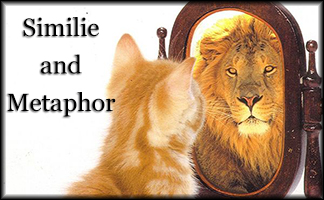
MEANING: A metaphor is a comparison implied but not definitely stated. In the case of simile the comparison is explicitly stated by means of such words as "like" or "as." In controversial situations the employment of metaphor or simile is to be avoided be-cause such figures of speech are apt to suggest likenesses not intended or not even the case.
EXAMPLE: Metaphor — "Napoleon was a fox." Simile -- "Napoleon was like a fox."
Both metaphor and simile are descriptive of one thing in terms of the qualities of another thing, i.e. , the word indicates a referent similar to but different from that to which it normally refers.
Our speech is filled with metaphors and similes: "birth of a nation," "a foxy negotiator," "a peach of a girl," "like a shot from a gun," "built like an ox," "sharp as a tack." In literature --prose and poetry -- the reader's attention is better caught by "Napoleon, the Old Fox," than by "Napoleon was crafty." Much of the beauty of religious literature is due to the varied and repeated use of these figures of speech, e.g. , "You are the salt of the earth."
A metaphor or simile, due to the shock of surprise at finding a familiar word in strange company, is a particularly effective way of securing a desired emphasis on the characteristic one has in mind. When Winston Churchill, in a famous speech, referred to Mussolini as that "utensil," he was conveying much more to his audience than if he had said "passive agent." To literally translate such figures of speech is to destroy their force, like explaining a joke. In literature metaphors and similes are judged by their vividness. But we want to know how accurate they are.
If the user of a Metaphor or Simile thinks he has proved anything he is quite mistaken. He has made the comparison; whether the two things compared really are alike is another question. In what respect(s) they are alike should at least be mentioned, if not demonstrated. Of course, no intelligent person would take a Metaphor literally, and in the case of Simile the words "like" or "as" (or their equivalents) prevent us from committing the error of identification.
But in the case of both Metaphor and Simile we must be on guard against reading into the figure of speech likenesses that are not really intended or are not actually present. Napoleon was not actually a fox. But it is conceivable that he was like a fox. But was the likeness with respect to his shrewdness or his thievery or both? or neither but with respect to some other attribute? And where is the proof of the likeness ?
The use of Metaphor and Simile is often accompanied by another difficulty. The customary emotive associations of a word tend to remain attached to it in its figurative use. "That man is clever in a subtle way" would be a flat substitute for "that man is a snake," but it would serve much more appropriately in a controversial situation.
We should, then, be very careful about using or accepting Metaphors and Similes in arguments purporting to be objective. Usually no justification of the comparison is given. The differences between the two things compared are normally greater and more significant than the similarities. A Metaphor or Simile is no substitute for an explicit description of the similarity.
Similes of the type "A is B, just as C is D" (where A and B are relatively abstract, while C and D are relatively concrete and familiar) tend to get easy acceptance if it is familiarly known that C is D. "Truth has many sides just as trees have many branches." An image, more or less vivid, is immediately formed in our mind of trees and their branches. But what of the other part of the Simile? True propositions do not have sides, although practically all trees have branches. Such ill-conceived Similes would not be apt to stand up in oral controversy. They are, therefore, more often found in public speeches or printed material. When presented with one of these, ask yourself if the opposite could be stated with as much or more plausibility -- that "error (or falsity) has many sides...." Finding that this has as much, indeed more, force than the original, you need to do no more to expose the fallacy; its convincingness disappears.
Personification and Animation are special kinds of Metaphor. To personify is to attribute human qualities to that which is not a person. The primitive mind tends to regard the tornado, as other major natural phenomena, as a person, an angry god seeking revenge. The "civilized" man smiles at such simpleness. Yet he uses and responds to the recruiting appeal, "Uncle Sam has a future for you." Here the government, which is not a person, is endowed with the traits of a human being.
What would be your response to the impassioned public speaker who, trying to promote the sale of government bonds, exclaims, "Old Uncle Sam can't win this war alone. Let's all help him to bear this financial burden!" ? If the speaker had wished to be objective and exact in his language, he would have spoken of the "government's need of money." But of course, put in such exact and neutral language, the expression would lose its moving power.
To animate is to attribute the characteristics of life to the non-living. The cartoonist who pictures an atom bomb holding the earth in the grip of its Claws is animating, and so is the union wit leader who attacks automated factories as "blood-sucking leeches." Cartoonists use Personification and Animation to simplify, to save time and space, and to make their message more persuasive. But always there is distortion and the possibility of misunderstanding, because they select for emphasis only those traits or qualities which serve their purpose, which is to encourage quick approval or disapproval of some person, issue, or event. They succeed best when they exaggerate. They are not hired to promote scholarly reflection.
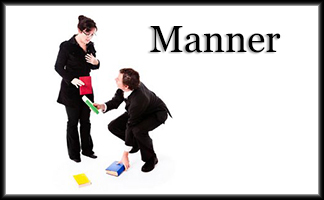
MEANING: A person's manner of behaving is made the basis of our acceptance or rejection of him without any thought that this manner may be a deceptive indicator of value.
EXAMPLE: "He was such a well-behaved man, so understanding, so sincerely helpful. He wanted to help us. I couldn't insult him. So I gave him our savings to invest. He seemed so trustworthy."
In the example given above, someone has become the victim of a "confidence" man, not at all a rare individual. These crooks are called such partly because they can inspire confidence. Widows, retired people, the elderly are their prey. Some people naturally gifted with ingratiating mannerisms sell worthless mining claims in Mexico, imaginary buried treasure rights in the Caribbean, and the like to naive trusting individuals.
It should be noticed that the fallacy of Manner, unlike Appearance, is attributed only to per-sons. How an appliance acts or performs is indeed a relevant and crucial concern in the decision to buy. But the human being is distinguishable from things partly in that he can put on the actions of the genuine, while things are incapable of deliberate deceit of manner and, generally speaking, act as they are.
The effectiveness of manner can be seen in hypnotism. The hypnotist fixes his patient with a steady gaze and in a firm, confident manner tells him that he is falling asleep. And if the patient is of the suggestible sort, he does fall asleep.
Persuasive manner is a matter of tone of voice, of how you carry yourself, etc. Certain natural mannerisms are fairly universally attractive -- as the smile. Those contemplating a career in public speaking find that if these ways of acting are not natural to them, then they must be cultivated. I am not saying that it is wrong to act in a persuasive manner. We can hardly divest ourselves of these natural gifts. They have an aesthetic value, and should be cultivated -where naturally absent. It is also true that he who believes in the truth of what he says, probably will speak in a confident manner. We cannot expect him to do otherwise.
Nevertheless, for those of us who listen it remains true that we should not mistake the show of sincerity for proof of the truth or value of a proposal. Sincerity is one of the easiest virtues to imitate. Almost anyone can put it on. A sincere and confident presentation of very foolish or dangerous proposals keeps the audience on its toes, but after all persuasive foolishness is still folly. There is every reason to believe that Hitler and Stalin and other famous political leaders were both confident and sincere; nevertheless their programs produced stupendous destruction and suffering for millions of trusting believers. Unhappily, even in a democracy, like ours, the public may encourage and reward a mere confident manner which is not justified by the circumstances or nature of the proposal being made.
Suppose Jones is running for mayor. He has a program of reform. He is not sure that his program will work, but he feels that there is a good chance that it will. Suppose, however, that in his speeches he were to breathe a hint of this uncertainty. Such might easily be his undoing. The public expects him to display extreme confidence in his delivery instead of a halfhearted, hesitating mumble. Doubt and hesitation (about himself, of course) are no part of the successful politician's repertoire. He thrusts out his chest, lifts up his head, and talks in a steady, loud voice, keeping a candid eye on the person(s) addressed.
It would be helpful, too, if the candidate were handsome. Appearance and Manner are often companion fallacies; taken together they are powerfully persuasive.
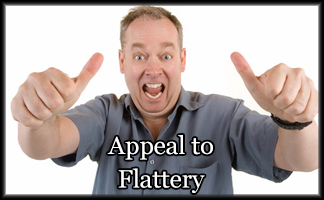
MEANING: An attempt is made to persuade us to buy or believe by flattering us on our personal appearance or in some other category where we excel or desire to excel.
EXAMPLE: Salesman to young matron answering the door: "Is your mother home?"
Vanity is a rather common weakness and is often exploited. Some people get completely undone by a little praise. In order to get them to do anything you wish, you have simply to compliment them on some slight achievement, real or fancied.
The device is freely employed in selling clothing and cosmetics. Indeed, no matter what the product or service, the judicious use of flattery early in the interview makes many a sale. So far as physical beauty goes the astute salesperson would hesitate about flattering either the very plain or the really beautiful. In the one case it would be so unrealistic as to be unbelievable, in the other case so realistic as to be boring. But if the housewife is "as homely as a mud fence," it is all the more likely that she is a "soft touch" for a compliment on her housekeeping.
Sincere flattery is to be distinguished from the insincere, but the actual distinguishing is anything but easy. The test is, "What's in it for him?" That is, if the flatterer has nothing, so far as you know, to gain from you by his flattery, you may more readily accept it. In any case, we need the habit of mind of asking ourselves, why am I buying this? is it just because the clerk says it is very becoming to me? but is it really?
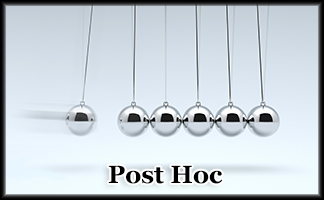
MEANING: Because two events (or things) follow one another in close temporal succession the first event is claimed to be the cause of the second. The form of the argument is: A precedes 13, therefore A is the cause of B.
EXAMPLE: "The bankers are the source of our troubles. You will notice that every depression is preceded by bank failures."
Certainly a hypothesis is permissible that a certain one of the many events that closely precede a given phenomenon is the cause of it. The fallacy consists in accepting the connection without further proof. This kind of thinking is particularly dangerous in historical writing, in politics, and in the interpretation of current events.
In our example the speaker has confused symptom and cause. A given cause or set of causes may have a multitude of effects, some of which appear in sequence. Whatever causes depressions, causes bank failures as an early stage of the depression. The physician does not say that the sore throat caused the cold, but that some virus caused the sore throat and then the runny 4zw nose that constitutes what is usually meant by "cold."
The Post Hoc fallacy is the basis of much, if not all, superstition. I suppose that nobody knows how the black cat superstition got started, but if like a host of others, it must have been on this order. In a situation where black cats were not common, one crossed the path of some important person. Moments later he stumbled and fell into a gorge, breaking his neck. Since it would not be seemly to blame the victim, and since it would be well known that all sorts of unseen powers operate in the world about us, the last remembered unusual phenomenon (black cat) becomes the cause. Science represents man's struggle to free himself from this primitive and spontaneous way of thinking.
Years ago what we now call malaria was called "swamp fever," because it was noted that people came down with the disease after moving to swampy areas. In that vague and vast complex called "swamp," scientists discovered the true cause, a certain kind of mosquito and its bite. We read in the paper that after Jones switched to Phillip Morris, his throat trouble disappeared. But perhaps the cigarette was still irritating, only other things counteracted. There can be several "causes" or active factors working simultaneously. Or maybe he liked Phillip Morris less, so smoked less, so less irritation. It is quite natural on our part to attribute our getting over a certain illness to the medicine we hopefully swallowed. The manufacturer of the remedy confidently rig claimed that "24 hours after taking" we would feel better, and we do. The demonstrated "efficacy" of the placebo, the doctor's little sugar pills, should suggest to any thinking person the desirability of comparing the number of times he gets better without taking anything at all as, against the times he gets better after taking his favorite tonic.
Without further investigation, scientifically done, the fact that X precedes Y proves nothing. We may take as a hypothesis for testing, that X is a-(or the) cause of Y. But we should not forget that any one of a score of other preceding events is equally worthy of investigation.
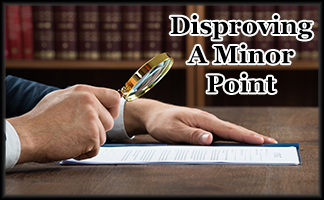
MEANING: When you have two or more pieces of evidence of varying degree of importance, your opponent takes one of the less weighty of your arguments (perhaps a rather trivial point) and discredits that. He then acts as if (or attempts to create the impression that) he has disproved your whole case.
EXAMPLE: Jones: "I believe that the installment system of buying has been a boon to America since
1. it has enabled the ordinary man to have what has hitherto been only a luxury for the well-to-do; 2. it has raised the standard of living; 3. it has provided employment for many clerks, typists, etc. , who must keep installment accounts."
Smith: "After all, the head of a gang of thieves provides gainful employment and so any defense of installment buying on the grounds of its providing employment is silly and evades the question as to whether this kind of employment is desirable. Therefore, I don't see that you have presented any substantial reason for favoring installment buying."
A discussant bringing forward a large number of facts in support of a contention may very well bring forward one, at least, that is incorrect. The incorrectness of that piece of evidence is not enough to undermine his conclusion, but an opponent who fastens on that one fact and proves its wrongness or its inapplicability and passes over the rest of his opponent's reasons as if they had never been mentioned can easily create the impression that the whole position of the other party has been discredited. There is nothing wrong with disproving a minor point, but if the intent is by this method to deceive or if the hearer or reader is so deceived, the fallacy of Disproving a Minor Point has occurred. It is as often a device of congressmen and lawyers as it is of more superficial debators in less dignified surroundings.
The fallacy may take the form of an objection to some fact you have brought forward (perhaps a mere illustration). Your opponent harps on this theme and raises so much heat and dust as to confuse. One man wanted to illustrate his argument by reference to a rectangle. So he looked around the room and pointed to a rectangular panel on the wall. His opponent objected that this could not be taken as an example because sufficiently careful measurement would show that its sides were not exactly straight and its angles not exactly right angles. Actually the argument of the first speaker was quite unaffected by the properties of the particular rectangle he took as his example. But the second speaker carried the day and left the impression that the first speaker had not a leg to stand on.
This fallacy is apt to be more successful when the objection' is given a touch of humor, perhaps satire. Then the other party is in danger of appearing somewhat ridiculous in his efforts to refocus the audience's attention on the rest of his evidence. The audience is more willing to laugh with your opponent than to follow your laborious efforts to return to seriousness. it is a mean way of obtaining a reputation for being clever, and the person who habitually makes such humorous diversions in a serious argument deserves no sympathy.
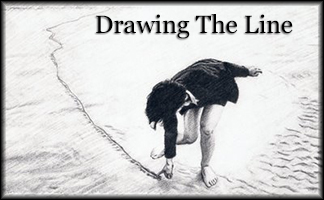
MEANING: Sharp distinctions are drawn where no sharp distinction exists.
EXAMPLE: "Either you tell the truth or you lie."
It is permissible to draw the line between those who are for you and those who are not for you, those who tell the truth and those who do not tell the truth, and so on. But the error and inclination exhibited by common speech is to fail to realize that the logical class of those who do not tell the truth includes two sub-classes that are quite different: (1) those who lie and (2) those who say nothing at all. And even though it is logically permissible, and even necessary, to distinguish the two categories, the living and the non-living, there needs to be a recognition that it is only arbitrarily that one could in actuality separate the two.
We often draw the line too sharply in moral and political matters: our position is good; theirs is evil. We and our allies work for international good will and order; the rest of the world is playing the game of power politics. In reality virtue and vice are not so neatly separated. A person is seldom all good or all bad. Rather, he is good in this respect, bad in that, etc. , just as a painting may be good in color and drawing but bad in theme.
The child's mind insists, and the tendency is fostered in many a classroom, on pigeonholing the main characters of history as "good" or "bad." "Was he a bad king?" "He was a good president, wasn't he?" There is no thought that a man might fall somewhere in between or that even a Nero could have some redeeming features.
These false dilemmas appear in advertising. "There is really only one good television set on the market today -- RCA Victor." Or, "You either get yourself a Babolux Automatic Washer and a satisfying wash or you buy another brand and remain dissatisfied." What is ignored is the continuous series of possibilities between the extremes. There may be a "Best Buy" in automatic washers but probably it is only one among many good machines.
Time and experience, aided by alert tolerance, should teach us eventually that right and wrong, good and bad, are labels which do not necessarily indicate absolute, fixed differences in quality.

MEANING: The fallacy of emphasis occurs only when another speaker or writer is quoted and one or more words emphasized so as to imply what would not otherwise be implied and thus put into the mouth of the source meaning(s) he may not have wished to convey.
EXAMPLE: When "we should not speak ill of our friends" is quoted, the original meaning changes if any of the following underlined words is emphasized: " 'We should not speak ill of our friends.' " Emphasizing " 'we' " suggests that we should not, true, but others may.
Emphasis in itself is not a fallacy but a valuable device for indicating the importance that one attaches to some idea or ideal and for exactly conveying one's thoughts to others. All good teaching proceeds by way of emphasis, oral or written. Oral emphasis is usually secured by means of pitch, tone, or volume of voice. Written emphasis is secured by a variety of devices, such as italicizing and underlining.
The fallacy of Emphasis occurs when the original meaning is thereby distorted. Imagine the sign posted in the men's dormitory: "No university women will be allowed in the dormitory without the consent of the head resident." A male student is found with a woman in his room, but a woman of the town. To excuse himself, he underlines "university," thus giving the impression that the university practically invites the women of the town to frequent the men's dormitories.
Sometimes the fallacy of Emphasis occurs through ignorance. We may have the mistaken idea that what we are quoting was originally emphasized in a certain way. Or we have no idea as to what, if anything, was emphasized in the original, but we feel that to make sense the original must or should have been emphasized as we emphasize it now. It is probable that Jesus used emphasis, and how helpful it would be to know when and where He did. But who today would pretend to know just which word in a given New Testament passage Jesus did emphasize. And yet we do not wish to hear the passage read monotonously without emphasis or expression. The malicious use of Emphasis occurs, however, when the reporter knows very well how the person quoted emphasized or did not emphasize but changes the accent in order to create a false impression.
In your reading look for "italics mine." That (or its equivalent) is the accepted way for a writer to indicate that he is giving a stress to certain words that the original author had perhaps no thought of stressing.

MEANING: We buy or believe out of respect for degrees or titles attached to the names of those "It who persuade us.
EXAMPLE: The name on the office door reads "James A. Rydack, Th. B. , M. Th. R. , As. D. A woman about to enter the office says to her husband, "With all those letters behind his name, he must know his stuff."
Americans are much impressed by academic degrees, less so by social titles. These symbols suggest authority and reliability. Most people do not know that there is a distinction among degrees -- earned and unearned. They do not know that some degrees are honorary; they do not represent a course of study at some institution of learning carried through to successful completion. The recipient of the degree, e.g. , D. D. (Doctor of Divinity), Litt. D. (Doctor of Letters), LL. D. (Doctor of Laws), may be honorable enough; he may have accomplished far more than any holder of a genuine Ph. D. degree. But again he may be honored only in repayment of a favor or in hopes of a favor. His scholarly attainments may be nil. The honorary degree is supposed to be indicated by writing "Hon." after the degree. Few recipients of the degree bother to do so. It can be seen how an unprincipled holder of such a degree might use it simply as a device to impress others.
A far more dangerous phenomenon than the exploitation of honorary degrees is the outright purchase of degrees from "diploma mills." These "institutions" (it may be only a man with a room and a desk) sell the Ph. D. degree as well as the other standard degrees plus any fanciful degree that the imagination could devise. The man who pays $25 for a Doctor of Bible Philosophy degree from, say, the California Biblio-Philosophical College may be expected not to hide that degree under a basket. Just how he plans to take advantage of the unwary by ostentatiously parading this "doctor's degree" before them, we do not know. Perhaps he will tour the country's small churches as a guest speaker, receiving substantial "love offerings." Perhaps he will set himself up in business as a Counselor of some sort, charging substantial fees for giving advice to the love-lorn, the occupational misfits, etc.
The fallacy of Degrees may occur even though one possesses an earned degree. One may be talking out of his field. A Ph. D. in botany is not thereby qualified to discuss international politics in an authoritative manner. Thus even the professor with an earned Ph. D in botany may exploit his prestige. He can use that Ph. D. to impress so that people believe what he says because of his academic prestige rather than because of the evidence that he actually presents to support his position on the matter under discussion. Nor should we forget that there is some gradation of value among earned degrees. The value of a Ph. D., and so the authoritativeness of the holder, is greater in the case of some institutions granting the degree than in the case of others.
In America we grant no social titles of a hereditary nature comparable to the "Duke" and "Duchess" of Europe. We have an abundance of social titles nevertheless. Organizations, political-and otherwise —offer titles to the deserving or fortunate: "Mr. President," "The Honorable," "Mayor," "His Honor”, “Judge “, "Supreme Councilor," "Grand High Potentate." Within wider or narrower circles; these titles have their impressive value for the highly suggestible. Titles carry no guarantee that the possessor knows what he is talking about. All such titles carry some prestige and can be readily abused.
Ask yourself honestly what would be your reaction if you were told that an exiled count was now living in your community. Would you go out of your way to meet him? And when you met him would you treat him, and what he had to say, with more than ordinary respect? Really there is no good reason why you should; even though the Count may hold his title legitimately, he may be the world's prize fool.
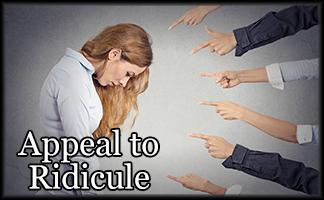
MEANING: An attempt is made to influence us to accept a certain proposition by poking fun at those who oppose the proposition.
EXAMPLE:The professor, on the first day of class, having made a certain statement, is asked an embarrassing question by a member of the class. Preferring a cheap victory to an honest discussion, the professor replies, "I am afraid, Mr. Jones, that I cannot understand what you mean. You are too deep for me." He then goes on to the next questioner.
In the example cited above the impression will be left on the minds of other students that the questioner must have been talking nonsense, since it cannot otherwise be supposed that the professor was unable to understand the question. At least that is the impression the professor hopes to leave.
Some people laugh easily. They love a good joke and are favorably inclined toward the purveyer of ridicule and sarcasm -- so long as it is not directed at them. The speaker or writer may attempt to reduce his opponent's position to a humorous absurdity by ridiculing his opponent's appearance, manner, background — anything. He may succeed in making his opponent look silly or foolish, but it is no substitute for answering the other party's arguments.
The following is a copy of a form letter received through the mail:
"Dear Fellow Traveler: I have the distinguished honor of being a member of a committee formed to raise fifty million dollars to be used for the placing of a statue of Harry Truman in the Hall of Fame in Washington.
We have decided not to tease it by placing it next to George Washington, who never told a lie -- or next to Lincoln, who was known as Honest Abe — nor next to Jefferson who spurned a third term. The committee was in quite a quandary, but after much deliberation, it was decided to place the statue next to that of Columbus who, after all, did not know where he was going, or where he was when he got there, nor where he had been when he got home, but he made the entire trip on borrowed money.
The inscript to be engraved on the Truman statue will read "I pledge allegiance to Harry Truman and to the indebtedness for which he stands, one indispensable with crime and corruption for all."
Five hundred thousand years ago Moses said, "Pick up thy shovel, mount thine ass and camel and I will lead you to the promised land." Five thousand years later Roosevelt said, "Lay down your shovel, sit on your ass, light up a camel -- this is the promised land." Then Truman came along -- took away our shovels, kicked us in the ass and gave away our promised land.
If you are one of those who dares to have money left after your taxes are paid, we will expect a liberal contribution.
Your fellow traveler."
Obviously an attempt is being made to discredit former President Harry Truman. It would appear that this case of "mud-slinging" did not meet with the anticipated success. It is, however, a classic example of pure ridicule without any appeal to reason.
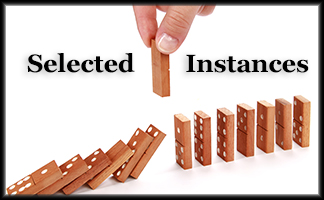
MEANING: Support is drawn for a position by choosing to cite only those cases or instances which back it up and neglecting to mention (though being aware of) those cases or in-swot stances which would support an opposed position. A common form of the argument is: All A is B; because A1, A2, A3, and A4 are B. The form is invalid; the dishonesty of owl the arguer lies in his knowing that at least As is not B. moot
EXAMPLE: Someone says, "All professors are conceited." When asked for his evidence he re-plies, "Well, how about Professor Smith, and Professor Jones, and Professor Blaine. omoit Everybody knows they're as conceited as they come." But he deliberately skips over Professor Blake whom he knows to be a model of humility.
By its very nature this fallacy is deliberate deception. No one in intellectual honesty can hold to the proposition that "All professors are conceited" if he knows of one that is not. Of course if his position had been that "Some professors are conceited," he would not need to mention, though he knew of them, professors that were not conceited. This fallacy occurs where sweeping generalizations are made. How absurd it would be if two people set themselves to argue the question of whether Jews were cheats, and one of them said that they were and "proved" it merely by pointing to members of the cheating-Jew class, while his opponent similarly "proved" his case that Jews were not at all cheats by pointing to the members of the honest Jew class. No doubt examples could be found of each class. Yet it is clear that neither of these two men would be proving his case at all -- clear also that the case could not be proved by this kind of argument.
This sort of behavior is anything but scientific. Were a scientist to gather or preserve only the data or statistics that favored his hypothesis, were a sociologist to take note of the opinions only of those who thought as he did, he would soon lose his professional standing.
In some areas Selected. Instances is so commonly done that it has come to be the expected thing. In advertisements giving testimonials as to cures brought about by some patent medicine, only letters from satisfied customers are reproduced. As a matter of fact the company may have in its files more letters from dissatisfied customers than from satisfied. in politics the Republican campaign literature picks out the good things the Republicans have done and the bad things the Democrats have done and says nothing about the bad things the Republicans have done and the good things the Democrats have done. Of course the Democrats use the same device, so that between the two parties the truth is told. But this is to assume that the voter reads both sides. Of course he should, but then can this situation forcing us to do so be fully justified?
Lawyers commonly use Selected Instances. Their purpose is to win the case, not to find the truth. The judge or jury is to find the truth. Nevertheless there are those lawyers who are painfully aware of the moral problem here and who themselves find a higher obligation to truth and justice above their obligation to their client, such that they cannot enter a "Not Guilty" plea for a client whom they know to be guilty nor can they withhold damaging evidence when it becomes apparent that the prosecuting attorney does not have available a particular piece of evidence that would of itself incriminate the defendant beyond question.
Statistics easily lend themselves to this fallacy. "Statistics do not lie but liars use statistics." One can easily select those figures (or that method of compiling or collecting figures) which support one's preconceived position. It is noteworthy that in a scientific age respectful of statistics, all sides on practically every great national issue are able to quote statistics as proof. There are charts, tables, and graphs to show that the present administration has endangered the economy; the party in power will present as many statistical studies to show that it has invigorated the economy. Rival claims as to circulation or readership of newspapers were in a state of anarchy till an audit bureau was set up with a standardized procedure for counting. So long as there remain different definitions of "unemployed" used by agencies or individuals collecting statistics in this field, we will continue to be told graphically that unemployment is getting worse and also getting better.

MEANING: Instead of attacking your proposition, your opponent directs his argument against you as a person.
EXAMPLE: Smith: "This town needs more efficient and vigorous police protection. Some on the police force should be retired and some should be fired."
Jones: "Absolutely not. And who are you to talk about improving our police protection? As I recall, thirty years ago you did time for forgery."
No doubt about it, this is a mean and despicable way of discrediting ideas to which one is opposed. Yet it is commonly done. In court the lawyer for the defense may have no case at all, so he attempts to save the day by attacking the character of the plaintiff. Such personal attacks are effective because it is difficult to believe or trust a man whose character has been questioned. What has been called character assassination is far easier to commit than to correct.
Influenced by Freudian psychology many moderns have directed their attention, not to the reasoning behind the pronouncements of Jesus and Socrates and lesser greats, but to the alleged psychoses and neuroses that made these men say what they did. Now Socrates may have been a psychopath, but his arguments are not to be rejected for that reason. It is possible for a crazy man to be right, and if we profess to examine a man's propositions advanced in argument, we must consider only his conclusions and premises and logic. A man's character, or lack of it, his personal idiosyncrasies, his follies and foibles, anything about him as a person, is irrelevant to the validity of his argument.
If we are told that we believe in the truth of proposition "X" merely because we have been "conditioned" in a certain way, the proper retort is that our opponent considers "X" false merely because he has been conditioned in a different way. We shall usually find that those who use the Ad Hominem seldom realize that it may be applied to themselves. Thus a Marxian economist sees the doctrines of classical economics as false, "since they are merely products of a special historical situation," but the Marxian economics is regarded as infallibly true and not as the mere product of a historical situation. The Marxist may be silenced with his own argument.
"Consider the source" is a popular device for closing off argument. It might be considered the opposite of the status appeal. Here you make use of your opponent's ill fame or notoriety. Now it is true that if we are to evaluate a mere statement made without supporting evidence, the past reputation for reliability of the speaker is relevant. As a person Hitler has come to have a bad reputation. But is every proposition ever uttered by Hitler false, no matter what evidence he offered? Even when the Ad Hominem is not a trick, even when you sincerely loathe your opponent, you have the first obligation to consider the force of his argument, not of his person. What really counts, logically at least, is the truth of the statement or, if evidence is presented for a proposition, whether the conclusion is valid.
The Ad Hominem attack often takes the form of discounting a proposition by attributing prejudice or bias to its supporters.. Jones declines to attend a panel discussion on some topic be-cause, so he says, all the participants are biased and they cannot discuss the topic impartially. Smith refuses to read an article in a magazine because he is sincerely convinced that the writer "has an axe to grind," i.e. , is not capable of discussing the matter on an unprejudiced basis.
But what motivates us to believe as we do, say what we say, is one thing. The truth or falsity, validity or invalidity, of what we say is another. To refuse to look for any truth in the position of those who, it is alleged, are prejudiced in their point of view would be to deny ourselves a goodly portion of the world's truth. It is possible to be prejudiced but right. A man may selfishly support what nevertheless ought to be supported by all intelligent persons.
Still another type of Ad Hominem is the "you too" device. Jones argues that people should not stay away from church on Sunday. Smith dissents, pointing out that he has seen Jones on the golf course, when he should have been in church, the last three Sundays. Such a failure, even if true, reflects only on your opponent's sincerity, but does not prove his position wrong. We do well to recognize that because of the frailties of human nature we do not always live up to our own highest convictions.
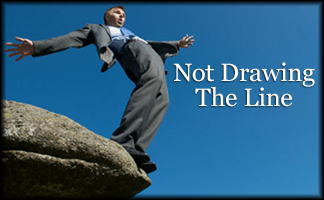
MEANING: The existence of differences is denied just because the differences are so small and therefore apparently unimportant.
EXAMPLE: "If we are allowed to stay out till two o'clock in the morning, why not till three -- one hour doesn't make much difference."
This is the opposite of the previous fallacy. It is popular among young sophisticates who argue that one drink more, one more liberty with a member of the opposite sex, won't make any difference. By such "logic" some young people can argue their parents out of all restrictions. It is true that one hour more would make little difference temporally. But these "little more's" add up. At a party a man takes "one little drink" and not long after, another "little" one. And on and on. "It's only one and so small." But it is this extra little that finally has a cumulative effect which makes him helplessly drunk or belligerently hostile. In social matters, "just a little more," carries you each time further from some previously accepted rule or principle until it ceases to function at all. The line must be drawn somewhere.
Everywhere we turn in this world we note the property of continuous variation, such that it becomes difficult to determine when a booklet becomes a book or when a shirt becomes a coat. But to argue that therefore no objective distinctions exist or no separate classifications can be made is just as foolish as to insist that because the words "sane" and "insane" are different and opposite words, that therefore, there is an unbridgeable chasm between the sane and the insane and that people very obviously are either wholly sane or entirely insane. In degree of height, as well as of intelligence, we could arrange the people of the world in a continuous row of progressively greater size or scope. The range of possible variations is infinite and at any one point in the progression only the most acute observer might be able to distinguish any difference between two successive individuals. But the difference is there and that between the extremes would be tremendous.
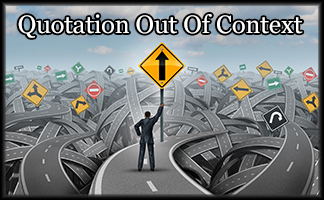
MEANING: Quotation out of context is a fallacy when the effect of quoting a given statement without its context is to distort the original meaning in context.
EXAMPLE: Someone quotes the Bible as saying that "money is the root of all evil" but leaves out the preceding words, "the love of."
Quotation out of context, as emphasis, is in general necessary and not a fallacy. Imagine how much quoting we would do if the rule were that to quote any part one had to quote the whole. Then to quote a sentence from a book we would have to quote the whole book! And really, the con-text of a given statement is not merely the words that precede and that follow but every accompanying circumstance, whether it be time and place or gesture and facial expression.
Selecting texts to give a one-sided presentation of the truth is a widespread method of propagating erroneous views. Out of the Bible can be drawn phrases or verses that justify everything under the sun, including contradictories. Read in context the Bible may be a liberal document, but it is not that liberal. What we need to know is if the Bible as a whole supports a given position.
Look out for this fallacy in testimonials for merchandise. You may be sure that the advertiser has selected for reproduction from customers' letters only those phrases or sentences that favored his product, omitting anything unfavorable they may have said.
Those who sell books may select from book reviews only the favorable part and reprint that. The advertisement quoted a prominent professor as having written that "this book covers completely all the major problems." Left out was what the reviewer also said about the textbook: "contains nothing new" and "very tedious reading."
One of the most frequent and prominent misuses of Quotation out of Context is in the advertisements for plays, movies, and other forms of entertainment. Even the worst of movies or television shows may have some outstanding feature which is mentioned by the honest critic. Thus if the reviewer had said, "What a stupendous outlay of funds (referring to the cost of making the film) for what is a terrific waste of our time," the advertising may speak of the film's being "hailed by critics" as "'stupendous,'" "'terrific.'"

MEANING: We buy or believe because of the large numbers associated with the product or proposition..
EXAMPLE: From an advertisement: "One million more sold this year than last."
Americans like bigness: it must be good if it is big. We like to .hear of record shattering performances. High sales figures for a book or an insurance policy, even if genuine, simply prove that the product or idea is selling; they do not prove its truth or value, especially for you. Is Shakespeare great because millions have read his works ?
The fallacy of Numbers can take the form of a reference to age. "Our firm has been in business 100 years." If a firm is 100 years old, we can hardly object to that fact being mentioned in advertising. But the customer should think twice before buying on that basis alone. Even though the firm is that old, it may be about to collapse. A younger firm may as a matter of fact offer a superior product or service.
A picture of a gray-haired man in an advertisement is a case in point. The advertiser may be capitalizing on the thought subconscious in so many minds that age confers wisdom. Really, gray heads or bald heads are not necessarily wiser heads; neither in man nor in book does age alone guarantee truth. Is the Bible great because it is old?
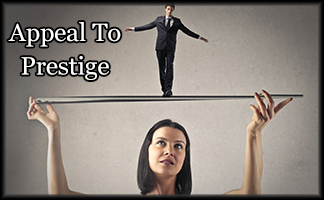
MEANING: An attempt is made to induce you to buy or believe by stating or suggesting that such action will secure or maintain prestige for you.
EXAMPLE: Real estate advertisement: "Live in exclusive Broadmoor Terraces, where successful people live. Deluxe executive apartments furnished in the Continental manner."
Thousands of Americans have prestige. Millions more are seeking it, and so advertisers tie their products to this desire. It is not just homes and apartments that are exclusive. Clothes and furniture confer status -- or at least the purveyors of these commodities make this claim. "Exclusive" is a magic word. Having what most cannot have somehow elevates you above the common crowd. Supposedly the commonalty will look up to you. And so the person who thinks he has prestige and who wishes to maintain it is fair game for anyone who plausibly suggests that ownership of such and such is a mark of prestige and is so considered by the general public.
This appeal is often called the snob appeal. In their effort to cast a halo of exclusiveness, snobbishness, and high status around their brands, advertisers may picture what appear to be social leaders using the product, or the product being used at places frequented only by the rich or the aristocratic or the upper class, such as yacht clubs, fox hunts, luxury-hotel swimming pools and the like.
Status and Appeal to Prestige, though related fallacies, nevertheless represent quite different errors. In the former case it is suggested that if Jones, a person possessing or allegedly possessing status, buys or believes, so should you. There is no implication that your buying or believing will confer on you equivalent status. The Appeal to Prestige suggests that you should buy or believe because by so doing you will acquire or improve status.
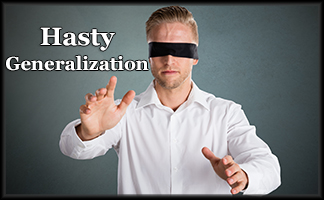
MEANING: The arguer jumps to a general or blanket conclusion about the members of a given group on the basis of an unrepresentative or insufficient number of cases. The form of the argument is: A1, A2, A3 are B; therefore all A is B.
EXAMPLE: Having observed five women to be poor drivers, Jones generalizes and declares that all women are poor drivers.
The sweeping, blanket assertion (or denial) is often a spontaneous outburst due to anger or some other deep feeling of the moment. When a professor fails a student for (so far as the student can see) no good reason, the student may indignantly protest that "these professors here don't give a darn for the student." We pass snap judgments on first impressions and superficial examination of the facts. We say many things in our haste which we repent of in our leisure.
Selected Instances and Hasty Generalization have much the same effect. There are important differences, however. Hasty Generalization typically occurs on an emotional basis, while Selected Instances is typically coldly calculating. In the former case there is, at the time at least, no awareness of opposed instances; in the latter case, there is. Selected Instances is not merely crooked thinking but dishonesty. On the surface the two fallacies are apt to look alike, and until we have evidence that the arguer is really deliberately closing his eyes to contradictory cases, we cannot label the fallacy as Selected Instances.
A statement of the form "All A is B" is very rarely true and is very easily disproved. A single instance of an A which is not a B is sufficient to overthrow it. If one maintains the more moderate proposition that some pacifists are cowards, he could not be defeated; for he could undoubtedly bring forward one or more examples of pacifists who were cowards and his contention would then be established. One reason why we are so much inclined to say "all" when "some" is really the case is that a sentence with "some" says so little. Suppose that we say quite truthfully "some union leaders are dictatorial." We have said so little that it was hardly worth saying at all. After all, just one is "some." But if we wish to make a significant statement and also be truthful, the form of statement we need is this: "60% (or some percent) of union leaders are dictatorial." This does not mean that all union leaders are dictatorial or that all leaders of management are not dictatorial or that this particular union leader is dictatorial, but simply that the examination of a fair sample of union leaders indicates that 60% of them are dictatorial, such that one can- predict that any other large group of labor leaders that one might examine will show much the same per cent of them to be dictatorial.
The truth or falsity of a general statement of the form "all X is Y" or even "no X is Y" can-not be determined other than by an examination of actual X's. If such an examination discloses only one X that is not a Y, then "all X is Y" is false without further examination. If one X that is Y is found, then "no X is Y" is false. In the absence of such contradictory instances, the examination would have to proceed till all cases were examined. Strictly speaking, "all" must mean "all possible," i. e. , all past, present, and future. Given such a meaning of "all," confirmation becomes impossible.
Thus we settle for sampling procedures that, while no indicators of truth, yet for practical purposes sufficiently well indicate reliability (or unreliability) of general statements.
What is a fair sample ? Is it numerous? Not necessarily; that depends on the total number of cases available. A fair sample of whooping cranes would be quite small, since there are very few left on the earth. However numerous the sample, it must be representative -- insofar as that is possible. It must include all factors thought relevant to the occurrence of the phenomenon being investigated. Suppose we want to investigate the driving skills of women. Would section of country make a difference? Therefore we do not examine women drivers just in the North, but also in the South, etc. But how many North and how many South? Of the total number of women drivers how many are estimated to be in the South? Thirty million of the total of sixty million? If so, and if our total sample is to be ten thousand, five thousand must be from the South. And so also for the other factors thought relevant to driving skill: physical condition, age, education, etc.
One can even generalize hastily about one person. "Don't say 'ain't.' Can't you ever learn to speak correctly?" The question here is rhetorical. The speaker means to say that the one ad-dressed has not, does not, and probably will not use the English language correctly. And to say that is a gross exaggeration. For one occurrence of an error of speech is hardly representative of a hundred or a thousand words used in a day's time.
Strictly speaking "all women are poor drivers" is not a Hasty Generalization, and is not a fallacy. It is just a statement that is likely to be false. The fallacy of Hasty Generalization always consists of two parts: (1) a statement of particular cases, one or more; (2) a general statement based on these particulars.

MEANING: A proposition (1) is said to be true because it has not been disproved or (2) is said to be untrue because it has not been proved.
EXAMPLE: "I know that man's soul is immortal. Why? Because you can't prove that it isn't."
What is not disproved on a given occasion is not necessarily true. Is a scientific theory accepted as true because you cannot disprove it? Rather, the theory must be verified positively. The existence of the soul after death cannot be disproved. But that does not necessarily mean that the soul does exist after death. By this method, as you might surmise, it might equally well be proved that God does and does not exist. Smith says to Jones, "There is a God because you can't prove that there isn't." Jones replies, "But then I'm right in contending that there is no God, be-cause you can't disprove that" [i. e. , cannot prove that there is a God]. Suggest any new idea, and you are likely to meet with the opposition of those who demand that you prove your position in advance, and your inability to do so is then taken as being conclusive evidence that such a change would be unwise.
Of course in formal debate we artificially agree beforehand that the affirmative is right till disproved, just as in this country you are innocent till proved guilty. But in ordinary argument neither side, pro or con, is made right by the inability of others to disprove it.
In its extreme form the Appeal to Ignorance amounts to a shifting of the burden of proof from one's own shoulders to those of the opponent. It is a clever trick if done successfully, and is the kind of argument which stuns by its boldness. Someone starts to prove that a college education should be free. You say, "Oh, I don't know about that. Why?" Then comes the blow: "Just give me one good reason why it shouldn't be free." And you set to thinking of what reasons you could give. None occurring to you, you give up and your opponent claims an easy victory. But really the burden of proof rests on the first man. Every person who presents a proposition in argument has the obligation to offer at least one reason in defense of it.
It should be pointed out that even your opponent's successful attack on all the premises or reasons you advance does not in all strictness make his position right and yours wrong. All he has shown is that your position is not true for your reasons. Other people, now or later, may be able to produce better reasons. Similarly, your being able to show that your adversary in his defense has involved himself in contradiction is not sufficient to prove him wrong. Smith may be arguing that the taking of life is evil, but admits that he doesn't object to killing animals for food. There is contradiction and confusion, but Smith may still be right that the taking of life is evil.
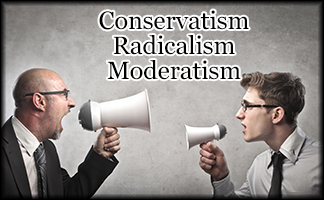
MEANING: These three habits of mind or traits of character often are forms of prejudice. But they are not necessarily such. Prejudices have histories with a beginning. But the conservative, the one who prefers what is old or familiar simply because it is old or familiar, may be born such; it is a part of the temperament he brings into the world. Radicalism is the habit of preferring the new or the revolutionary just be-cause of its newness. The moderate habitually chooses middle-of-the-road or com-promise ground; he avoids the two extremes.
EXAMPLE: (1) "This belief is an old one, but I want you to know that the old ways are the best ways."
(2)"What we need is new ideas, completely new ways of thinking; the old is not worthy of our acceptance."
(3) "Vote for me. My program is neither conservative nor radical,"
No doubt there are times when our position should be conservative, times when we should take a radical stand, and still other times when we should be middle-of-the-road. It would depend upon circumstances, but such adjustments are difficult; for all of us are by native temperament, ingrown habit, or training prone to adhere to one or the other of these three positions, which are obviously exhaustive, taking care of all possibilities. As we get older these attitudes of mind be-come more fixed. It should not be thought that only the elderly are conservative. Young people are very often conservative; and if so, they are likely to end their lives still conservative.
To escape from such bondage by basing one's stand on any particular issue only on the avail-able evidence and the best reasoning is difficult. Indeed, moving from being conservative on one issue to being radical on another to being moderate on a third would probably earn one the label of "vacillator" or "fickle." Such people "can't be depended upon." But why should one consistently take the conservative position disregarding any objective need for change? Consistency is not a virtue in and of itself.
Indeed there are two kinds of conservatives, one of which we can do without, while the other type does perform a useful service. The "die-hard" conservative opposes all reforms and innovations regardless of their merits simply because they run counter to the old familiar ways. This embattled conservative is both the guardian of and a slave to the past. Frequently he even re-shapes the past to support his argument. There is some virtue in holding fast to the gains of the past, but it is no longer a virtue when an alternative procedure promises greater benefits. Such a conservative needs to be told that "a conservative is a man who worships dead radicals."
Other conservatives are willing to change if you can show them that more is to be attained by change than will be lost. Meanwhile they perform the useful function of pointing out the value of present belief or practice. All change involves some sacrifice; we need to evaluate carefully the cost.
There are two similar types of Radicalism and of Moderatism. A dyed-in-the-wool radical prefers change just for the sake of change. He is unreasonably antagonistic toward or sceptical about all past and present beliefs, ideas, etc. , regardless of their specific merits. This is the kind of thinking that encourages acceptance of new fads in everything. But the radical who will continue to accept the old if you can show him that more would be lost than gained by change per-forms a useful function in that he points out the imperfections of the status quo.
Moderation has great appeal in America because of our tradition of political compromise and good sportsmanship. Here a position is recommended merely because it is the mean between two extremes. How often do you hear such statements as "Don't be extreme," "Can't you show a little restraint," "Meet the other fellow half way."! But there is no inherent virtue about adopting the middle-of-the-road position. Nor is there anything obviously meritorious about compromise as such; yet preference for a middle position can be as intense and fanatical as the passion for either extreme.
This may be because compromise is supposed to preserve something of the good of both sides, although it is equally possible that it preserves only the bad of both sides. Compromise and moderation are also recommended as serving to keep the peace. The Soviet Union has squeezed concession after concession out of the United States by the strategem of making excessive demands and then urging negotiation and compromise.
Aware of the appeal of Moderatism, representatives of the most diverse opinions present their views to us as being desirable middle-of-the-road proposals, but the middle position always depends on the nature of the extreme positions. For example, a politically moderate position in 1900 would be the conservative position today. With sufficient ingenuity you might find for almost any position a more, and a less, extreme position and thus be able to recommend it as a compromise. One could recommend. American socialism as a desirable mean between Communism and Fascism, or Communism as a mean between Capitalism and Fascism, or Fascism as a mean be-tween Communism and Capitalistic Democracy.

MEANING: An abstract term is a word or symbol which stands for the qualities (one or more) possessed' in common by a number of particular things, facts, or events. The fallacy of abstract terms occurs when an arguer employs a word for which he may have meaning in the form of other words, but the arguer is unable to identify the concrete facts to which the word supposedly refers.
EXAMPLE: A speaker defines "neurosis" as "a psychological term for a state of mind involving the nerves," but when he is asked to identify or point to -- among a large number of people -- a case of neurosis, he is at a loss to do so, showing that he is unable to use the term to make any concrete distinctions.
Abstract terms are necessary. They enable us to think of a whole class, as "philosopher," in its common features and not only of the particular members of the class, as "Socrates" and "Aristotle," with which we are acquainted. The child must learn to think increasingly in abstract terms. Some people experience great difficulty here; their habit is to think in terms of particular, concrete pictures or images.
Such terms as "freedom," "religion," "good," "beauty," and, “spirit" are highly abstract and their referents are not as concrete as are those of such abstract terms as "dog" and "board." In the latter cases the meanings can be carried by a mental image of an external object or action. This is not so easily done, if it can be done at all, in the former cases. So it is that some people consider such terms "meaningless."
It is probable that the vocabulary of most, if not all of us, contains one or more Abstract Terms which are meaningless for action. These words become useless baggage which cannot function effectively to help guide us to sound conclusions that we can apply to understanding and manipulating ourselves and the external world.
The cure for this fallacy is to ask for examples of what is meant and to test one's under-standing by asking, "Would this be an example?" Not that the example need be an actual case be-fore our eyes, but that the words used to illustrate must be action words describing particular situations. If your opponent cannot or will not provide such a reduction or translation, then further discussion with him is pointless, since no evidence or counter-evidence is relevant to the meaningless.
The dictionary game of substituting one set of Abstract Terms for another is apt to lead no-where except to frustration. Someone may say that a philosopher is "a lover of wisdom," but the speaker's identification of particular philosophers would soon make evident to those who under-stand the term that the word is purely abstract for him and his identifications but random stabs in the dark. Now when you tell him that Socrates was a philosopher and also John Dewey, then if he knows these two men or, more properly, their writings or sayings, he may be said to under-stand the term. Still, since such designation is purely denotative, he cannot yet be said to have a sufficient system of ideas attached to "philosopher" to make it function as it ought -- not till he can point to the element(s) in the writings or sayings of these men that make(s) them philosophers.
A politician may tell both an audience of union members and an audience of corporation executives that he favors "justice," and he may do this because, unless he is required to state in specific concrete terms what he means, no one in the audience can criticize so long as he does not have the slightest idea as to what the speaker means. Candidates for public office, clergymen, spokesmen for national organizations can fill their speeches with Abstract Terms, especially such honorific ones as Justice, and hide behind them, knowing full well that they will not be likely to alienate or disturb anyone.

MEANING: Persons or objects for which we have a strong sentiment of respect and esteem -- or which'at least possess some degree of fame or prestige -- are introduced into the argument as endorsing that which we are asked to buy or believe.
EXAMPLE: Advertisement appearing in the Hampshire Gazette, January 29, 1790: 'resident) Washington -- when he addressed the two houses of Congress on the 8th instance was dressed in a crow colored suit of clothes of American manufacture: -- This elegant fabric was from the manufacturer in Hartford."
The example may be the first recorded use of Status in American advertising. It has been going on ever since. Clothes and every conceivable product are sold on the status or prestige of prominent people. Just who has status at a particular time in a particular society varies, but the use of Status never ceases. Today the "stars" of the entertainment world (singers, athletes, etc.) °If have the greatest merchantable prestige. Perhaps in tomorrow's world the scientists will come into their own. But as things are today, a quick survey of the advertisements in your favorite national weekly or monthly magazine will give you some inkling as to what sort of people carry weight.
The office of the President of the United States carries tremendous influence, but the President must not exploit it to endorse for pay or for publicity any commercial product or service. Similarly others in lesser public offices. The "stars," even though they are public figures, do not (with exceptions, of course) have such scruples.
They or their business agents lend their names and/or faces and/or words of commendation to this or that item. They may not ask for monetary reimbursement; publicity itself has cash value for these people. As George M. Cohan is reported to have said. "I don't care what you say about me, but please spell my name right." They may not have seen the product they endorse; if seen, it may not have been used; if used, they may not have been satisfied; if satisfied, they may not be competent to give an opinion.
Famous people's pictures and names operate as attention getters; they stop the eye flitting from page to page. The famous person's glowing testimonial for Blatz Beer does not serve to merely catch and hold attention. It is there to influence our decision to buy. Evidently there are people who will wear Botany neckties because Bob Hope does. Yet by no stretch of the imagination does Mr. Hope's expertise in choosing a good joke qualify him to choose a good necktie.
Apart from its use in advertising, prestige affects nearly all of us, even in the small group of the small community. On the campus of a certain small college sorority girls enjoy unusual status, and those girls who do not belong to a sorority may be heard to argue, "Well, the sorority girls do it, so it must be all right."
The use of Status may on occasion have a negative emphasis. The fact that some prestigious person is against some product or idea is offered as evidence. Where the person's prestige is relevant to the matter, as the prestige of a noted biologist on some biological question, the appeal to status might seem to be unexceptionable. Far too often, however, as in the case of Harvey's discovery of the circulation of the blood, leading scientists have lent their prestige to squelching new ideas that seemed to threaten the scientific establishment of the day.
Infrequently one may even find cases of reverse Status, or what may be called the appeal to the notorious or to ill fame. The fact that "bad" people are for or against anything will stir up feelings of aversion and result in our arraying ourselves on the opposite side. To be told that Hitler loved certain of Wagner's compositions is enough to turn some music lovers against Wagner for the rest of their lives.
Under the heading of Status we will subsume pseudo-reputation. The speaker of the evening is billed as "World Famous Dr. ________, Psychologist, Author, Lecturer, World Traveler." Overwhelmed by such an array of prestige terms, the members of the audience listen enraptured by his incomprehensible description of the latent power of their psychic vibrations. They buy his book that tells them "How to Live Forever," and they sign up (payment in advance) for his $25 course of lessons. Today, with the vast resources at its disposal, the communications or public relations industry can overnight give to an unaccomplished unknown world-wide fame. Should the head of a large newspaper chain decide to push a comparative nobody into the public eye, front-page pictures and write-ups will do it in one edition. Tomorrow he may be referred to as the "well known (if not "famous") Mr ______. In a day when any unusual performance (however indecent, inane, illegal, or inept) is good copy the country over, temporary fame is fortune's gift to the ignorant and incompetent. And there is an amplitude of purveyors of fame who are ready to exploit the commercial value of this fleeting fame (for a commission, of course).
Under the heading of Status we may also subsume what may be called the misuse of the appeal to reverence. Some objects and persons with status are worshiped or almost so. In our country Lincoln may not be reverenced, but the two major political parties quote his words freely with the assurance that they will not be doubted. Elsewhere in the world the opinions of dictators and strong men are received as having scriptural authority.
The Bible, the Church, and saints do not enjoy as wide oracular authority as they once did. But in the countries where these authorities have lost the most ground, new authorities (as Marx or the Communist Party) have been accorded similar status. There a favorite device for closing discussion is to allege that your stand agrees with that of "our Sacred Father Karl Marx."
Here, as in the case of other appeals, a twofold use is possible: a use by the honest and a use by the dishonest. Deceivers frequently find it convenient to associate themselves with revered objects. The reverenced authority actually has nothing to say on the matter under discussion and the deceiver knows this, but he says that the authority does and that it supports him. When a man says, "I take my stand on the Bible," we ought at least to know just what his stand is and whether it is really vouched for by the Bible. There is nothing wrong with quoting the Bible, if it be quoted accurately and true to its context. But if one purports to solve a problem or find the truth objectively or scientifically (not religiously), one can admit the Bible as only one witness among many possible ones. It is quite all right to quote an authority, but you should give the reasons and the evidence that this authority presents. If none are forthcoming, the authority should carry little weight in any scientific settlement of the controversy.
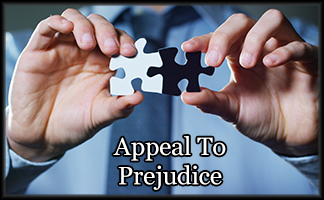
MEANING: The one who makes the appeal to prejudice attempts to persuade you to act or feel in a certain way by associating his person, product or proposal with a certain one or more of your prejudices.
EXAMPLE: A young man, wishing to make a good impression on his girl friend's father, learns that he is a rabid Democrat. So one evening while waiting for the daughter to finish dressing, he engages the "old man" in conversation, and the young man turns the conversation to the point where he can rip the Republicans to pieces. The father later informs the girl that the young man has "good stuff in him" and "should go a long way."
A prejudice is not merely a prejudgment -- a judgment made in advance of a hearing, with-out examining the facts; it is a prejudgment wrapped in emotion and having a history. A person's 4 prejudices do not occur overnight, though their antecedents may be traced back to a single event in that person's life.
Prejudices can be either for or against. Typically every negative prejudice has its positive complement, but the two poles may not be equally strong. If you are against Mexicans, presumably you are for non-Mexicans, but this positive feeling may be not nearly as strong as your antipathy toward Mexicans.
Many prejudices hang on the fact that people of like interests work more or less as a group and members of a group, particularly a long-standing one, have a favorable predisposition toward members of the group and an unfavorable bent toward non-members. Generally speaking, professors are favorably inclined toward fellow members of the profession; given a report of a conflict between a professor and a student, they are already inclined to take the professor's side. Typically, students will behave in the opposite way.
In Appeal to Prejudice someone who knows our prejudice is exploiting it to his advantage. Knowing that we hate Negroes (or Caucasians or what have you), he makes himself out to be a hater of Negroes (or whatever) too. Not only does he rekindle our prejudice; he also arouses in us warm feelings toward the one who apparently shares our prejudice. And so it becomes much easier to make us believe or buy whatever he has to offer.
There is such a thing as a purely personal prejudice. Such will be discussed later. Here our concern is with mass prejudices, for our exploiter is more apt to know which mass prejudice we share than what our individual idiosyncrasies are.
Mass feelings are not necessarily appealed to en masse. Given a mob that he is addressing, the demagogue will play upon every prejudice shared by members of the mob in order to encourage their acceptance of himself or what he stands for. But the same appeal would be made in private conversation with a member of the crowd. True, the exploiter prefers the public appeal to the private appeal, for in the crowd situation each man's prejudice gets reinforced by every other man's prejudice.
We commonly think of prejudices as religious or racial. Yet one could have an anti-religious bias. There are national prejudices, geographical prejudices (North vs. South), and occupational prejudices (labor vs. management). Nor is prejudice necessarily based on such broad concerns. Even hobbies can warp our minds such that we tend to view with suspicion all those who do not share our interest in, say, stamp collecting.
In all likelihood those who would arouse our prejudices are themselves prejudiced too. But they may be sufficiently realistic that "when they are in Rome, they think as the Romans do." A very versatile politician making a swing of the nation may, when in the South, try to identify himself with Southern antagonism toward the North, but when in the North he identifies himself with anti-Southern feeling. When speaking to labor audiences he arouses, and identifies himself with, their bias against management. But when addressing a luncheon of corporation executives he cries out against the "labor monopolists."
"Do you want to know who's behind this proposal [what the speaker opposes]? tell you. It's another one of those damn Yankees." The effect hoped for is much the same as that of slogans: terminating thought and promoting action. The proposal might as a matter of fact be the wisest course of action, but the victim of the Appeal to Prejudice is prevented from making an objective examination of the opposed claims.
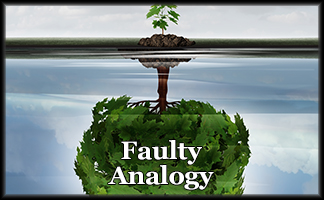
MEANING: To reason analogically is to reason that because two or more things or types of things are alike in some one or more respects (we may call this the antecedent resemblance), they will therefore be found alike in some other respect(s) -- the consequent resemblance. In cases of reliable analogies the antecedent factor is already known to have some bearing on the occurrence of the consequent factor. In faulty analogies such knowledge is lacking. The form of the argument is: A is like B in respect c; therefore A is like B in respect d.
EXAMPLE: "Last quarter I had a student by the name of Orzymski who did good work. This quarter I have another student by that name, and I'm expecting good work from him."
Analogy is a permissible form of argument and is often used in science. If we find buried in the Sahara Desert a watch-like object with springs and gears etc. , we may confidently conclude that it has a maker since we have found regularly in the past that watches had makers. Do we know whether or not an atom bomb will explode if dropped over the Atlantic? No, but we accept that it will because we have tried out the same sort of bomb elsewhere, and we reason that if it exploded under certain conditions at one place, it will explode under the same conditions at another place. The prediction that the Atlantic atom bomb will explode is highly probable, not merely be-cause we have seen others explode but because on the grounds of theory and entirely independent of prior atom bomb explosions we know that it must explode.
On the other hand, the prediction that two eggs which look exactly alike will taste exactly alike is a bad one, for we know by experience that the outward appearance of eggs is an unreliable guide to their inward condition. Analogy is no substitute for observation and experiment. Every analogy, however good, must break down at some point, since no two things in the universe can be exactly alike. If they were, they would not be two but one, identical and similar. If there is no other discernible difference, there is one of space and/or time. Strictly speaking, the proof that the Atlantic bomb will explode is to drop it and see.
Apart from its use in the area of the physical sciences, analogy is used in law and related concerns. The case at hand falls under a precedent. It is so analogous to a previously decided case that the decision there must be applied here.
Analogical argument is very persuasive, but we must be on guard against taking superficial resemblances between two things as grounds for believing that they must have a certain other property in common. The soundness of an argument from analogy will depend on whether the basis of resemblance (the property or properties which A and B are known to have in common) is (are) actually connected with the property c. In our example, while it is true that Orzymski is a rare name in English-speaking societies and while it is even probable that a second Orzymski en-rolled at the same college would be related to the first, we need evidence that heredity is the decisive factor in scholastic performance. In the watch example, our experience is that we have never seen a gear that did not have a maker. But our experience also contains an abundance of cases of relatives with widely different scholastic records. An analogy is not stronger than its linking generalization: All gears have makers; heredity determines scholastic performance. We can have no confidence in-an analogy based on the latter, for it is a generalization without much support. And even when wide experience supports a given generalization, it may subsequently be shown to be false and so the analogy based upon it, as when it was argued that whales must breathe by gills since whales resemble fish in general shape of body and in habitat. The regularity of watery habitat and gill breathing has an exception.
The scientist uses analogies as hypotheses or guidelines in seeking new truth or a fresh and more rewarding understanding of his subject matter. To note that thermostats on furnaces are like informational feedback systems of the human body leads to a new science, cybernetics. The noted resemblances are suggestive of further important similarities. The analogy suggests but does not itself establish what will be discovered. We ought never to feel certain of a conclusion which rests only on analogy.
A highly effective device for winning an argument is to exaggerate one's opponent's contention by asserting "Then you must also believe that...." or "This is the same as saying...." You introduce an allegedly analogous situation -- a situation which is generally regarded as undesirable, therefore by analogy your opponent's position is undesirable. Resting as it does on exaggeration, such an analogy would be unacceptable.
Some arguments take the form of alleging a complete analogy: two things are alike to the point of identity. The argument then is: A (or all A) is c and B (or all B) is c; therefore B is A (or. A is B). "Communists will not take the oath of allegiance and neither will Jones. Therefore, he must be a Communist."
Saying that Jones is like Communists in one respect -- he refuses to take the oath of allegiance -- becomes the basis for alleging that Jones is like the Communists in all respects, i.e. , is wholly a Communist, possessed of all essential characteristics of a Communist. The absurdity of this sort of argument becomes readily evident when we see it is just like saying "Dogs have tails; this cat has a tail; so this cat is a dog." (Notice how a good antidote to a fallacious piece of reasoning may take the form of a counter-argument which exhibits by analogy the superficiality and erroneous character of the original argument. )
Few would conclude from the fact that all cats and all dogs, have tails, that, therefore, all cats are dogs, in however disguised a form this proposition was presented to them. But if we are seriously debating less concrete matters, our interest is less in the form of the argument and more in its content. Then it is that otherwise intelligent people may argue, "If these men are not communists, what are they? They admit that they are radicals. And what are communists, if not radicals?" The subject matter is explosive and calls out strong emotional reactions; the argument is left somewhat incomplete. This combination of circumstances leads us to swallow the argument.
In discussing Metaphor and Simile I made the point that neither one, especially Metaphor, should be used in controversial situations. That remains true. But a metaphor or simile appearing by itself is not an argument, and is very uncertain in meaning. Analogies make use of simile and make clear how A is compared to B, but it still must be said that analogical argument is strong only when A and B are essentially the same kind of thing, for then, if A has a property deriving from its essential nature, B must have the same property.
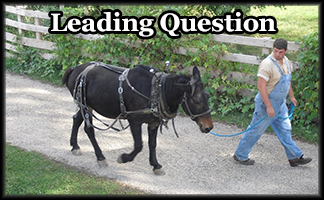
MEANING: A leading question is one which (1) dictates or suggests an answer or (2) one which incriminates the answerer (or places him in an undesirable position) no matter how he answers.
EXAMPLE: (1) "It was early in the morning, wasn't it?" (2) "Since when have you stopped drinking?"
In the first example the answer "Yes" is natural and is apt to be forthcoming, especially if the person to whom the question is addressed is highly suggestible and/or half awake. Of course someone else could have asked the question in a different way: "It wasn't early in the morning, was it?" The Leading Question, of both types, is apt to be more successful if preceded by a clever build-up.
In selling, the first type of Leading Question is often employed as a device to neutralize the prospect's naturally negative attitude, "Like any parent, you are interested in your child's progress in school, aren't you?" The prospect's saying "Yes" represents agreement with the sales-man. It thus becomes harder to disagree about the purchase.
Salesmen are trained not to say, "Do you want this?" but "Shall I wrap it up?" Then when the customer arrives home, he asks himself, "How under the sun did I ever get this?" It is the clincher, employed in the deliberate, climactic moment of silence when the customer is making up his mind: "Do you want the whole set or will just the table be enough?" The salesman is not allowing you to entertain the question, "Why should. I buy any of these items of furniture?"
Any direct answer to the question, "Where have you been since I last saw you in jail?" implies a damaging admission -- that you have at some time been in jail. The prosecuting attorney hopes to catch you off guard as he snaps, "Tell me sir, have you stopped beating your wife? Answer yes or no!" Either way your answer is bad. The device is often used to great advantage in cross examination by eliciting damaging or contradictory admissions from a witness. The proper recourse is for you or your lawyer to say, "I object -- leading question." Of course, if tie question has already been answered, even though the judge orders the question and answer to be stricken from the record, that is no guarantee of erasure from the minds of jurors.
Under the second form of Leading Question may be included any question which assumes as true that which is yet controversial and undecided. "Why is it that labor leaders are so much less concerned about the general welfare than are the leaders of business ?" The one to whom the question is addressed tends to ask himself, "Now why is that?" or "What reason could I give for that?" when he ought to immediately respond, "Wait a minute! Let's settle first whether it is true that they are less concerned." Cleverly done, the effect of such a question is to put the hearer's or reader's mind to work helping the questioner. We should always critically examine the truth or the falsity of assumptions concealed in questions.
Sometimes a look at the context makes clear that what would otherwise be considered a Leading Question is not functioning as such in the case at hand. A person might start out to make a declarative statement, "It was early in the morning," but realize midway that it might not have been, and so turn the statement into a question, "It was early in the morning, wasn't it?" Under the circumstances it would seem odd for him to say, "It was early in the morning, was it?" His voice would indicate uncertainty, and so would not suggest only one answer to the respondent. Similarly, if someone were to say, "Since when have you stopped stealing?" in a tone of disbelief to a man who had just declared that he had stopped stealing, the context would clearly indicate that it was not the question that incriminated. The first speaker had already incriminated himself.
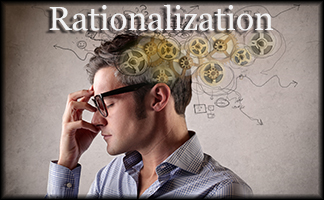
MEANING: You cite reasons or causes that will justify action that really has less creditable grounds.
EXAMPLE: The student, having failed the test, blames his failure on the classroom's being so hot that he couldn't think, whereas in reality he knows that he didn't spend enough time in study.
Rationalization is frequently a polite form of self-deception to defend or excuse some failure or misdemeanor. This is not necessarily hypocrisy; the rationalizer may not now be conscious of the real cause(s) of his act. He sincerely believes that the reason or explanation that he now advances is the true basis of his action or belief.
Often, however, we know well enough why we did as we did, but we feel a compulsion to make our conduct seem rational or virtuous by offering a justification or excuse acceptable to others. We are not deceived; others are.
Either form of Rationalization is a very dangerous practice. It encourages carelessness, laziness, and inefficiency as well as deception. By enabling us to always blame others rather than ourselves for our acts, it permits us to indulge criminal tendencies without twinges of conscience. Since bad habits are not easy to part with and may be enjoyable and profitable, we may prefer to rationalize them. A man is lazy and likes it; but since he could not expect such conduct to be excused as such, he hopes that by attributing his conduct to "innate conservatism" it will put him in a better light.
When we have adopted a belief on purely emotional grounds, our minds tend to immediately construct a reasonable, socially acceptable defense of this belief just in case it is challenged or criticized. Some people are extraordinarily creative in this art of inventing false reasons. No matter how great their art, it remains true that the belief caused the reasons instead of the reasons bringing into being the belief.

MEANING: To call a word -"vague" is to say that marginal situations can and do arise where there is doubt as to whether the word should or should not be used in describing those particular situations. The fallacy of vagueness exists when there is uncertainty as to the scope of a word.
EXAMPLE: Someone says to me, "Sit down on that stool," and I sit down on the thing he points to. His meaning is not ambiguous; I understand what he is referring to. But I find the term "stool" vague under the circumstances, and I protest, "But this is not a stool, for it has a little back to it, and so it is a chair." He may reply, "But there is really not enough back there to call it a back, so I call it a stool."
In our example it is not merely "stool" that is vague, but also "back." How high does a back have to be in order to be called a back ? The two parties to the dispute will agree that certain "stools" are stools and that certain "chairs" definitely are not stools, but they now come to recognize a questionable area in between. The dictionary definition does not answer that question. And the larger that doubtful area, the vaguer the term.
Vagueness is a quality of practically all words, except proper names. And it is an unavoidable quality of words, because although man believes that for the purposes of knowledge and communication his words should have limitation of scope and application, nevertheless the world is of such a nature that things are not neatly set off from one another, as our words suggest, but shade imperceptibly into one another.
Adjectives as well as nouns are vague. There is no rule that tells us how much "hotness" a thing must have in order for the term "hot" to be applied to it. Going to the dictionary will not settle the question as to where you stop calling something hot and start calling it not hot.
It is only by arbitrarily drawing a sharp dividing line that precision can be attained here. In common speech, the terms "urban" and "rural" are vague. But the United States Bureau of the Census, for convenience, makes its own division. If a concentration of population numbers 2,500 or more, it is "urban"; if less, "rural." Of course, it will always seem odd to say that just one more soul or less makes all the difference between urban and rural. But you have to draw the line somewhere, if you draw it all all.
Nature does not classify, but man draws a line because it is convenient. Scientists, in order to secure precise norms, have drawn many such lines. The everyday speech of the layman, however, is filled with vague terms. The range of application of the term not being settled, the scope one man has in mind may not be what the other has in mind.
Some Vagueness can be corrected by reference to a dictionary. When we add a word to our vocabulary we may have a very fuzzy idea of its scope. Even though we have observed the term being applied, we are as yet unable to define it. We are too lazy to take the trouble to consult a dictionary in order to get a clearer idea of the range of application of the word. Consulting a dictionary whenever a new word is encountered is one of the best habits a young person can cultivate.
Many are the times that someone does not get what he wants and what he has paid for because he did not take the pains to specify what he wanted and so someone took advantage of the vagueness of language. This is a very serious matter in contractual arrangements. A man contracted the building of his new home. According to the contract, the builder was to "landscape" the area about the house after it was built. All the contractor did was to grade the surface after putting two inches of topsoil over gravel. The contractor might have surmised that the homeowner wanted shrubs or trees set out or at least a lawn put in, but since nothing was specified, the contractor took advantage of the vagueness of the word "landscape." You may find in the dictionary that "landscaping" means "improving or developing grounds." Did the contractor do enough to justify use of the term "landscape?"
That is why legal contracts, especially insurance policies, are so often so wordy and complicated. By specifying, by drawing lines, both parties have their interests safeguarded. It may be harder to understand, but one can be surer both parties will understand it alike; through stipulating the nature of the landscaping expected, there would have been less opportunity for a dis-honest exploitation of vague terms. Of course, if people are in too much of a hurry to read the fine print in a contract, they may in the future encounter surprises, some of them unpleasant. The "guarantee" in the large print was impressive; if they had taken the trouble to read the fine print they would have found the guarantee practically worthless because of the numerous qualifying restrictions.
Perhaps the most deplorable area of Vagueness is advertising. The advertisement says, "Our product guaranteed." The reader understands "guaranteed" as meaning that if he is not satisfied with his purchase, he may return it and get a replacement, reimbursement, or repair --whichever he wishes. That the scope of "guaranteed" could' extend to anything less than that never enters his mind. And so he buys, but is dissatisfied. Now when he returns the item he finds that the advertiser considers it quite proper to use "guarantee" as covering only repair of the item with the customer assuming half the cost of repair. Generally speaking, in cases of deliberate exploitation of Vagueness the seller intends that the prospective customer understand the term in the sense most favorable to the customer, whereas, if there is trouble and the purchaser is dis-satisfied, the seller will use the term in the way most favorable to himself, i.e. , at the opposite end of the term's area of vagueness.
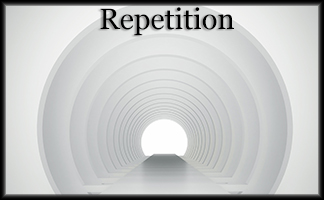
MEANING: We buy or believe because we have heard or seen the idea or the product name so often.
EXAMPLE: Radio commercial: "Get up with GET-UP. GET-UP's got get up. Got it? Get it Get CRT-UPI!"
The above-cited commercial for a bottled drink employs reiteration in the extreme. Not that repetition as such is bad. Repetition is a valuable teaching device. If one sincerely believes that what he has to say is true, even essential, then he will feel justified in repeating for emphasis and retention. Nevertheless we who read or listen need to be on guard against swallowing something merely because we have heard it so often.
Suppose two men running for public office. One man, Jones, does nothing by way of campaigning. The other, Smith, does almost nothing. But he does post signs in a great variety of publicly conspicuous places -- "VOTE FOR SMITH." These simple signs give no reason for voting for Smith or for supposing that he is a better man for the office than his rival Jones. Other things being equal, who do you suppose will win the election? Presented with a ballot, the voter will say, "Jones? Who's Jones?" But when he sees "Smith," that will ring a bell.
Repetition and Manner are often joined. If statements are made again and again in a confident insistent manner, without evidence or proof, then their hearers will tend to believe them quite independently of their soundness and of the presence or absence of evidence for their truth. Those who masterminded the Nazi movement in Germany know that the lie that "The Jews are corrupt depraved enemies of civilization" would be believed if it were repeated often and confidently.
Apart from its use in influencing others, Repetition may be a useful (though fallacious) device in convincing oneself. Among the methods of justifying belief Charles Peirce singled out one he called the "Method of Tenacity." Those who want above all a feeling of certainty will, whenever their belief is challenged, respond by reaffirming the belief -- perhaps several times -- in a firm and confident manner. The familiar words sound good to their ears, allay any temptation to doubt, and give them that virtuous sense of having been loyal to principles.
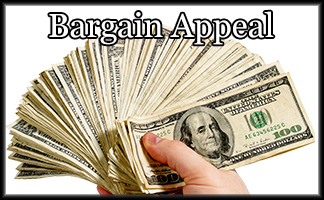
MEANING: An attempt is made to get you to buy by appealing to your desire to save money. If you buy without making your own comparisons as to price, quality, and service or if the one who offers the "bargain" hopes that you will so act, a fallacy is committed.
EXAMPLE: The supermarket has a special display at the front of the store: canned peaches by the case (eight cans) for "only $3.20." Checking the shelves where single cans of peaches may be purchased, one finds the same brand priced at 40 cents per can.
Almost everybody loves a bargain, and this desire to save money is freely exploited, as any other urge, by the enterprising merchant. For only "a box top and 98 cents" you get all this: a dish, a book, a bird, etc. The customer thinks that the cereal company is giving him something in order to get him to continue with their product. It is a device to persuade him to continue, yes; but the manufacturer, even if you do not buy another box, may not be out of pocket, not even perhaps if the clerical help mailing out premiums is counted in. It should not be forgotten that the cereal may be priced in the first place high enough to take care of all such costs. Or, the 98 cents may be an excessive charge for low quality merchandise. It might even be that the manufacturer makes more money on the premium than on the cereal. Then, still sticking to cereals, there is the large "family" or "economy" size. If you divide the price by the net weight in ounces and so get the cost per ounce, you may find that the "large economy size" is no cheaper per ounce than the smaller size -- and often less convenient.
Closing out sales, fire sales, lost-our-lease sales, and the like appeal to the bargain hunter. And there may be bargains, and the sales may be genuine. But it is quite possible that these promotions are cover ups for pushing off on the consuming public inferior merchandise brought in just for the sale and marked at low prices that nevertheless allow the seller a comfortable profit.
"FACTORY TO YOU," "WAREHOUSE SALESROOM," "BUY AT WHOLESALE," "BIGGEST DISCOUNTS EVER," "NEVER UNDERSOLD": all such headlines imply bargains. Before you swallow the bait, you had better check elsewhere on price, quality, and service.
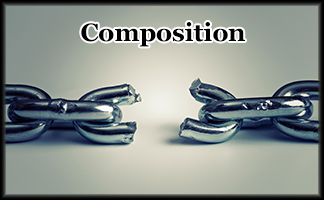
MEANING: We reason as if the properties of elements or individuals were always (i. e. , necessarily) the properties of the wholes which they constitute. But the assumption that what holds true of a part is automatically true of the whole cannot be justified. The form of the argument is: M, N, and 0 are parts of X; M, N, and 0 each have the quality a; therefore, X has the quality a.
EXAMPLE: "He's a nice boy; she's a nice girl. I'm sure they'll make a nice married couple."
In our example the mistake is to think that marriage is a whole that equals the sum of its parts. It is rather a creative synthesis. He and she may be very nice taken individually, but in their effect on one another in the close association of marriage, they may bring out each other's worst qualities.
Hydrogen and oxygen are gases; mixed they are a liquid. The whole may be more than the sum of its parts. The distinction to be made here is between arithmetic wholes and synthetic wholes. "This grain of sand is light; this one is light; this is light, etc. Therefore, all the grains of sand are light." We are speaking arithmetically. But the pile that all these grains compose is not light. The pile is not an arithmetic total; it is a synthetic whole.

MEANING: A series of questions are put and then the questioner demands that they be answered as a whole by either "yes" or "no." Since there is always the possibility that the answerer needs to answer each of the questions separately and differently, the com-plex question puts the answerer in an unfair position.
EXAMPLE: "Do you deny that you were in the room at the time of the murder ? Do you deny that wit you always hated the man? Do you deny that if you couldn't have killed him yourself you would have been glad to have someone else do the dirty job? Answer me, 'yes' or 'no.
The person to whom this Complex Question is addressed may not wish to deny that he was in "t) the room at the time of the murder. His being there is an established fact. And while he would deny that he always hated the victim, he would admit that he had strongly disliked him for some time. But he would vigorously deny any thought of committing murder himself or any pleasure in contemplating someone else's having committed murder.
The Complex Question has the effect of the Leading Question, and for that reason it is not admissible in court — if the attorney on the other side raises an objection. Although the question and any answer elicited may then be ordered to be stricken from the records of the trial, it is not likely that the answer would be erased from the mind of a juror.
In the hands of clever people, the Complex Question becomes a device for discrediting the respondent, particularly one who is nervous under questioning, by involving him in a contradiction. Having first demanded a single "yes" or "no" answer to a rapid-fire series of questions and gotten it, later the interrogator may repeat each question separately. Now the questioner receives the "no" answer and the "yes" answer where each properly belongs; after which it is easy to show that the respondent now answers "yes," whereas before he answered "no" when required to reply to the series of questions with a single affirmative or negative answer. The questioner turns to the audience or jury and remarks, "Isn't it obvious that what this man tells us is so confused and inconsistent as to be worthless ?"
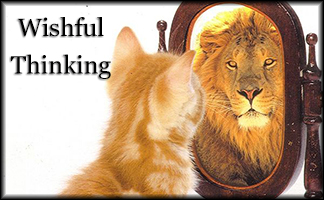
MEANING: You believe a proposition is true because you want it to be true.
EXAMPLE: "My son will win because he ought to win after all his long hard preparation."
The wish is father to the thought -- often regardless of the evidence. We deduce what "is" from what we feel "must be."
Because they themselves did not wish war, some pacifists have refused to believe that any nation really wanted war. It is the kind of willful sentimental blindness that makes people rest their hopes in the idea that this or that dictator on the international scene would be appeased if only we were gentle and trusting in our relations with him. When such false expectations are dis-appointed, the rude awakening may be more than we can bear.
It is human nature to believe that what we desire or need to be true is so, refusing to consider the evidence that would destroy the reality or possibility of those objects to which our most pleasurable emotions have become so fiercely attached. Likewise we tend to accept any proposition the truth of which would protect those hopes. Thus it is that the man who has bet his last dollar on a horse running at a hundred to one will, like a drowning man, grasp at any straw of rumor that this horse has a good chance to win.
When we are forced to admit that our wishes have not become reality, we may then seek comfort in rationalizing_ If, in the example cited above, the son does not win and the contest is fair, the parent will feel the necessity of inventing some argument that will excuse the son's failure.

MEANING: A word or phrase is ambiguous if in the mind of a hearer or reader it has two or more quite different meanings and the interpreter is uncertain as to which was really meant, In argument such a situation would at all times be undesirable.
EXAMPLE: The candidate for public office says, "If elected I will see to it that the people of Wayne County get a fair deal in Washington," and one or more people hearing him are left wondering whether "fair deal" means "reduced taxes" or "increased subsidy benefits."
A word or phrase may have a great variety of meanings, and yet when the term is used no-body is confused. The context on each occasion of its use makes clear that only meaning "x" is intended. Nobody is confused by the item in a rural newspaper: "Authorities are puzzled by the case of whiskey left in front of the Center Church last night. No one has turned up to claim it, but Chief Brockton is working on the case." Nobody asks, Do they mean by "working on the case" the case of whiskey or the police case? Thinking of the two possibilities we find the news story amusing, but not confusing. Likewise with such deliberate play upon words or sounds as when Hilaire Belloc wrote, "When I am dead, I hope it may be said, 'His sins were scarlet, but his books were read '”
Ambiguity is relative to context. When the context of the word does not afford enough clues, we have a case of Ambiguity. A term may be ambiguous to one person on a given occasion but not to another. A term may be ambiguous to me today but not tomorrow. In one sense of the term the statement containing it may be regarded as true by the interpreter; in the other sense, false.
The proper reaction to Ambiguity is a demand for clarification -- if the user of the word is within demanding distance. However, another glance at the verbal or actional context may remove the Ambiguity.
The voter who is on his toes will find the politician's promise of a "fair deal" to be quite ambiguous. He will demand that "fair deal" be made clear, perhaps by illustration. Of course, once the candidate makes clear that by "fair deal" he means "increased subsidy benefits," he ma lose votes, for some people would not consider increasing subsidies a fair deal, though they would think reducing taxes to be very much a fair deal.
On most occasions when a word or phrase is ambiguous to most of those who read or listen, this failure of communication is quite innocent on the part of the writer or speaker. When the president of the organization said, "All members are not paying," quite unintentionally he left most of his audience wondering whether he meant that not even one member had paid or that some members were not paying. There are, however, situations where deliberate Ambiguity is employed. When the mayor says that his chief of police, accused in tonight's paper of having misused the powers of his office, "has lived up to my expectations in the year that he has been in office," does he mean that the chief has been a failure just as the mayor expected or does he mean that the chief has done a good job and the newspaper is not to be believed? It may be that the mayor wishes to raise both possibilities in the minds of the citizens until the mayor has had time to investigate the matter sufficiently.
A very common type of Ambiguity is created by the omission of the quantifier. Quantifiers are words like "all" or "some." Suppose the statement that "Women are poor drivers." When you hear a statement of that form you ought to ask yourself, What is meant: "all" women, "the majority" of women, "most" women or what? True, the speaker ought in the first place to have made it clear.
Whole sentences, paragraphs, yes, even a complete article, may be ambiguous. We are clear as to the meaning of the individual words, but we are not sure just what the writer or speaker means to suggest by the statement taken as a whole. "This wonderful woman gave $500 to the Community Chest." But we wonder: Is she a wonderful woman because she gave $500, or is she wonderful on other grounds and, incidentally, gave $500. It makes quite a difference.
Where Ambiguity is due to incorrect grammatical construction or syntax, as in "Henry liked pudding better than his wife," it is often referred to as Amphiboly. The parts of the sentence are so fitted together as to leave the reader in doubt as to the true or intended meaning. Often the interpreter cannot distinguish the subject from the object, or there is confusion as to the antecedent of a relative pronoun, or there are misplaced modifiers. It may be a case of improper punctuation. The logician simply calls attention to this fact; the grammarian seeks to teach writers how to make themselves clear.
Although often trivial in nature and humorous in effect, the outcome can be practically costly when, due to misplacing of words or punctuation, a wrong meaning is conveyed, as in a telegram or commercial order. When a man raised this sign above his store, "Why go elsewhere to be cheated; trade here," it was not a beneficial error.
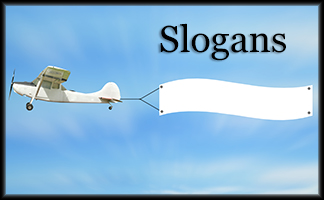
MEANING: A slogan is a short, meaningful, catchy phrase or sentence intended for general con-sumption and designed to terminate thought and promote action in favor of the slogan maker.
EXAMPLE: "THE BREAKFAST OF CHAMPIONS" (Wheaties); "LSMFT" (Lucky Strike Means Fine Tobacco); "WHEN BETTER CARS ARE BUILT, BUICK WILL BUILD THEM"; "BET-TER BUY BIRDS-EYE" (Birds-Eye Frozen Products)
Our eyes and ears are bombarded by slogans daily. Some are old and some are new. It is no longer true that slogans are devised after a given product has successfully been on the market for a number of years. Today a new product or service or promotion is presented to the public with a ready-made slogan. A slogan noisily (even musically) and frequently repeated and accompanied by that which is visually attractive captivates the imagination, is preserved in memory, and comes to the fore in your mind when you are about to make a purchase or otherwise commit yourself. Then the slogan takes over and controls your action, preventing further reflection. However true the slogan may be, if your action is merely a favorable response to the slogan, you are not being completely rational.
Imagine the young housewife, just married. Now she must wash her husband's shirts; hence she must buy laundry soap or detergent. Heretofore Mother has done such things for her. At the supermarket a bewildering variety of packages and messages greets her. It is in this moment of indecision that the manufacturer hopes "WHIZ WORKS WONDERS" will come to the forefront of her conscious mind and take over, promoting action in his favor and discouraging thought, thought along such lines as "which package gives me the most for my money." The slogan, like the words "forward, march" has triggered her action.
There are times, of course, when the slogan is legitimately employed. After a proposition has been soundly established or a course of action agreed upon, a brief phrase used as a short summary is excellent as a memory device and incitant to action. Thus the speaker can summarize his speech and bring it to a focus by concluding with the slogan "America must become the arsenal of democracy." After a long patriotic speech urging everyone to do his duty, to fight for his freedom, for all that he loves, for the sacred traditions that have made his country great --what better way than to summarize the argument in a brief phrase, "Fight to make the world safe for Democracy." A slogan or motto thus can sometimes be used as a terse and striking expression of a noble ideal, a spiritual truth, a great achievement or obligation. It becomes a powerful incentive to ceaseless effort and unflinching courage in the struggle to realize a commendable goal.
Nevertheless thousands of today's commercial Slogans are neither the outcome of a reasoned argument nor the expression of the results of experience. They are manufactured, made to or-der -- to arrest thought and to promote action regardless of whether the thing being sold is good or bad. And a similar production of Slogans occurs at every important election.

MEANING: The user of this device places himself or his product on a level of neighborly intimacy with the reader or listener. If our favorable response is based simply on such an appeal or if the user of it hopes that he will so respond, a fallacy is committed.
EXAMPLE: The salesman who on meeting the prospect for the second (or even the first) time slaps him on the back as if he were a long lost brother and addresses him by his nickname.
Folksy Appeal combines elements of Appearance and Manner. The politician in a rural district may hope that by dressing as farmers do (at least unbuttoning his collar) he may pick up votes by conveying the impression that he himself is a farmer at heart. Or, speaking to a certain audience, one may consciously and deliberately adopt their colloquialisms.
Folksiness is not harmful in itself. Some people seem to have a natural aptitude for it. Thrust into any group of people, they are able to speak and to act so as to be accepted almost immediately as "one of the boys." The advice, "When in Rome, do as the Romans do," is the voice of prudence.
Nevertheless, we also do well to remember that there is no necessity that the "plain folks" talker, the "ordinary Joe," the man "with the common touch" has our interests at heart. It may all be put on. The folksiness may be one more stratagem of the campaign manager or publicity agent. And so the candidate is pictured back on the farm with the old neighbors, among the pigs and chickens. Many politicians, salesmen, and others pride themselves on their commonness. And they may have genuine feelings of sympathy and concern for the common man. But when it comes to accepting what they have to say, folksiness is a poor substitute for objective evidence and sound reasoning.
This appeal is the very opposite of the Appeal to Prestige, and it is also much more effective. People are much more influenced by the thought that the salesman, or what he has to sell, is on their level than by the realization that he (or it) belongs to the class above them. In this connection it should be noted that while the Folksy Appeal is usually aimed at the middle class or average man, it is possible to be folksy on every level.
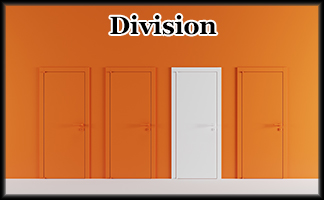
MEANING: We reason as if the properties of any whole are always (i. e. , necessarily) propel of each part. But the assumption that what holds true of a whole is automatically of its parts cannot be justified. The form of the argument is: X is composed of M, N, and 0; X has the quality a; therefore, M has the quality a.
EXAMPLE: "How dare you criticize any member of the Harvard faculty? This faculty has the highest reputation of any university faculty in the United States."
Even though a pile of sand is heavy, the individual components are not therefore heavy. each and every student in the room is bright (i, e., all students), then John Jones, a student in the room, is bright. But if the class is bright, it is not automatically true that Jones, a member the class, is bright. Again, as in Composition, we must distinguish between arithmetic and thetic wholes.
Things have a different character when in a group than when alone. A member of a group does not have to have a characteristic possessed by the group as a whole.
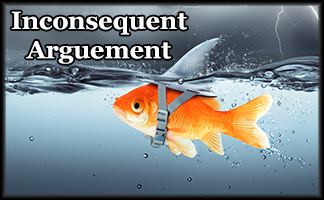
MEANING: The arguer proves or establishes something, but not what he said he would prove. Inconsequent Argument differs from Diversion in that in the latter nothing is proved, whereas in the former something has been proved, though not what the arguer was expected to prove.
EXAMPLE: Prosecuting attorney: "The defendant is charged with assault and attempted robbery. There can be no doubt of this man's guilt. In the past ten years he has been convicted thirteen times on different charges of forgery, theft, and rape. [The prosecutor then goes into each of these cases in detail. He passes to the jurors documents which sup-port what he has said about the defendant's record.] The sickening record that I have exhibited speaks for itself. Gentlemen, I ask for a verdict of 'guilty.' "
This fallacy depends upon failure to notice the substitution of the irrelevant conclusion (and its supporting evidence) for the proof needed in support of the original contention. When it does occur, it is apt to be in the course of an extended argument concerning a complex issue. It is useful to ask ourselves more than once, "What is he supposed to be proving?" With that well in mind, we will not be influenced by impressive irrelevancies.
In the example given above, surely proof of a previous bad record is a far cry from proof of guilt in the offense charged. Proof of a bad record is "inconsequential" -- of no consequence. If bad record proves guilt, then for every crime there are millions of guilty people.
In advertising, the Inconsequent Argument may appear as a claim in big, bold letters which, presumably, the small print in the advertisement is going to demonstrate; but instead of proving that a certain cigarette is "YEARS AHEAD OF THEM ALL," the rest of the advertisement merely proves that the cigarette has a nicotine content lower than that of four other brands.
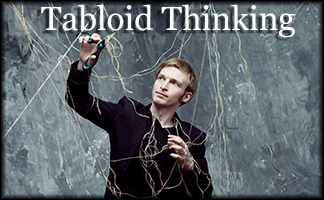
MEANING: To think in tabloids is to oversimplify a complex theory or set of circumstances. The tabloid thinker prefers quick summaries and has the habit of "putting things in a nut-shell."
EXAMPLE: 'In college Basil was taught all about evolution - the ape-man theory, you know.'
The truth about any matter of importance is seldom simple. Yet most people would like the truth to be made simple and will readily accept any short formula which seems to do so. The tabloid for biological evolution -- the "ape-man" theory -- is grossly inadequate. In addition to indicating nothing of the complexity of the theory of evolution, the tabloid suggests what in fact is false, that man evolved from the apes.
Americans are in a hurry. Students, for example, want the teacher to "boil it down," to "put it in a nutshell." Then the material of the course can be remembered easily, and can form the basis of quick review and restatement on a test.
Many American voters behave in a similar fashion. Voting requires action, and a simple summary of the character of a political party helps one to come to an early and easy decision: "The Republican Party is the Party of Privilege." To undertake a comparative study of the plat-forms or the records of both parties would be time-consuming and confusing.
Tabloids concerning people are likewise popular because they offer a neat summary of the character of a prominent person. "Marx? You don't know who Marx was? Why, he was that crackpot economist." It is much easier to remember Marx in this simple fashion than to remember him as a man of many interesting and important facets of character and conviction. The ad-vantage of such an oversimplified estimation of another person is that it enables consistent, immediate, single-minded behavior toward the other person. These human tabloids are typically emotional, but they are not mere Emotional Terms. To be Tabloid Thinking there must be some indication that someone is trying to sum up another's character.
The person who rejects the tabloids that are current may appear to be a public enemy since these tabloids are the very basis of most discussions of problems of the day. He who challenges the tabloids "capitalism is the free enterprise system," "democracy is government of the people, by the_ people, for the people," "business is dog eat dog," is likely to be resented.
The tabloid thinker is often a headline thinker. He reads the headlines in his evening news-paper and forms his opinions of persons and events on that basis alone. Joseph Pulitzer took ac-count of this fact when he said, "Let others write the news; let me write the headlines." But in the short space of a headline one could hardly hope to summarize accurately what has happened or what someone has said.
All stereotypes are tabloids because they represent a certain trait or characteristic, which is really superficial or trivial, as being the essential nature of a given class. "Musicians" are represented as "long-haired;" "librarians" as "cranky;" "barbers" as "talkative." These stereo-types appear in cartoons, novels, plays, and affect to some extent the attitudes and thinking of millions.
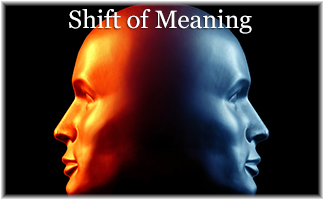
MEANING: In shift of meaning a word appears explicitly or implicitly two or more times in an argument but with different meanings. A fallacy occurs if the reasoning would be good only if the word had kept the same meaning.
EXAMPLE: "The fellow who was supposed to arbitrate decided in favor of the company and fined the union. Now anyone who takes sides in a dispute is certainly not impartial. So how can this fellow claim to be an impartial arbitrator ?" In the example appearing above "impartial" shifts meaning. In its first use it means "wholly refraining from judgment; taking no stand on an issue." But in its second use it means "judging after investigation but without previous bias." Obviously the arbitrator's being impartial in the second sense does not necessitate his being so in the first sense. The implied conclusion ("The arbitrator is not impartial") is invalid.
Many shifts of meaning are puns or humorous plays on words, either not meant to be arguments or else not meant to be taken seriously. Thus "Your argument is sound, nothing but sound" or Benjamin Franklin's famous pun: "If we don't hang together we'll hang separately." No fallacy is involved.
The longer the argument the easier it is for-a term to change meaning and for that change of meaning to pass unnoticed. Whether or not the writer or speaker is aware of the Shift of Meaning, it is still a fallacy.
In an argument between two people a given word may shift in the meaning given it by the two parties. This leads to what are called "merely verbal disagreements" or "merely verbal agreements." Again, if the reasoning depends on the word's being used in the same sense by the two parties, a fallacy has occurred.
With unabated fury two men are talking about "socialism." The first claims "socialism" is here already, "since the federal government controls prices, wages, and production of goods." The other retorts that socialism is a "logical absurdity; imagine anybody sharing a toothbrush with his fellow Americans." Now both men might agree about the extent of control exercised by the federal government and also about the impossibility of sharing all personal belongings. But by "socialism" one man understands federal control of economic activity; the other has in mind common use of personal property. Such talk at "cross purposes" means no meeting of minds; it may be cured by definition. If not cured, then those who engage in the verbal dispute will part company, each experiencing a sense of profound pity or contempt for the other and each thinking that "there are none so blind as those who will not see."
Similarly, you may say, "I believe in religion in the public schools. I believe that there is a place for it there and that the Founding Fathers intended it so." I reply, "I agree with you 100%. I favor putting religion in the public school curriculum. We should learn about religion as any-thing else." While it is true that I have agreed with you, investigation might show that we are agreeing on only a word; for what you mean by "religion in the public schools" is daily devotional exercises, but what I mean is that the history of religion be taught and I would never agree to any service of worship on school time.
Shift of Meaning occurs far too often in advertising and the sales talk -- and deliberately. The furniture dealer advertises a table as "mahogany." The reader of the advertisement thinks of a rich red finish and asks to see the item. Then he learns that it is brown and inferior -- Philip-pine mahogany. Really, true mahogany does not grow in the Philippines. "Philippine mahogany" is a name devised by the lumber people to designate a Philippine import of recent years. Consulting the dictionary on "Philippine mahogany" you would find: "not used technically without the qualification 'Philippine.' We might add: "and not used honestly."

MEANING: The fallacy of technical jargon is the use of technical language or unfamiliar words, whether contained in the dictionary or freshly coined, for the purpose of impressing people.
EXAMPLE: Advertisement: "Liberty Rubber's new tires contain durium, the bonding material that makes these tires wear for years." In the example given above, "durium" is probably not to be found in any general or specialized dictionary. It is a manufactured term, created to impress potential customers with the scientific qualities of Liberty tires. "Durium" sounds like "radium"; it sounds like a new element in the chemical table. It sounds as if the makers of Liberty tires have incorporated in their product some rare and recently discovered natural material which makes these tires the latest and best that scientific laboratories can turn out.
We have no quarrel with the use of scientific and technical terms if the words do have referents and are used where they are needed to convey appropriate information. Such language may be expected in scholarly journals. It operates as a kind of shorthand, compressing in a sentence what could otherwise be explained only in pages. Used by and among experts of a given field it saves time and secures precision. When used elsewhere, however, an honest effort should be made to explain in ordinary language the meaning of the terms used.
Scholars and professional people are sometimes guilty of using Technical Jargon. There is, for example, the scholar who interlards his paper, read at some gathering of his professional col-leagues, with foreign words -- Latin, French phrases, and the like. And yet the English equivalent is fully equivalent. It may well be that an attempt is being made to impress his peers with his superior erudition. Professors are often guilty of the same sort of thing in "talking over the heads" of their students. Then, among students themselves, there is the type who makes the same use of language to impress his peers with his brilliance. It seems to be an easy way to get a reputation for learning. In argument or debate, some people, feeling defeat in advance, get wordy in self-defense. If defeat does come, they can hide behind the big words and ascribe their defeat to the ignorance of the people addressed.
It is true that much obscurity in discourse is not intended, but is due to ignorance or carelessness; and there are those people who are more easily persuaded by what they cannot under-stand than by what they can. A writer who is thinking clearly and honestly can express his thoughts in words which are understandable, and in not very many of them -- if he is really writing for the reader and not for himself. Professionals and technicians who are humble will make an attempt to translate into the common language of their clients. A highly specialized doctor may give you the scientific name for your malady, but he will also try to explain your trouble in language that you can understand. Look out for the "doctor" who rattles off the big words and evades your at-tempts at clarification. He may be a quack.
This "gobbledygook" (the English call it "pudder") creates untold confusion and darkness in office memoranda and official communications distributed by governmental agencies, private corporations, and organizations in general. With its own vocabulary, complicated by an addiction to compounded restrictive clauses, "officialese" is a language unto itself. Suppose you are working in the Office of Interurban Affairs and receive this printed notice: "All government personnel in the Office of Interurban Affairs are hereby informed that they must contact their immediate superior to inform him (or her) of their preference among the following listed options of released time for the consumption of coffee (or similar beverages) and light refreshments midway during the morning work period." You might feel (and rightly) that clarity and economy would have been better served (even at the cost of dignity) by: "Tell your boss when you'd like your coffee break." In a day when there is so much to be done in no more time than ever there is no place for such pomposities and circumlocutions. We would do well to imitate children, who have the virtue of getting to the point quickly, without benefit of polysyllabic speech.
The injury of Technical Jargon is doubled when the language is not genuine but merely seems so. Advertising men are paid handsome sums to think up new names, trademarks, etc. , that will make the product sell. Many of these in a day of respect for science, and laboratory research have a scientific flavor. The same effect is hoped for from the use of letters and numbers, as "Snow White Toothpaste now contains XL-576." Numerical precision is emphasized in science, and the Snow White people, knowing that, may have devised their own numerical designation for what is not a new ingredient of their toothpaste nor even of toothpastes in general. They hope to give the impression of scientific support for that which has no scientific support at all. "Brand X gasoline is best for your car because of its 'controlled volatility.' How many readers know what is meant, if indeed anything is meant, other than "Buy Brand X"?
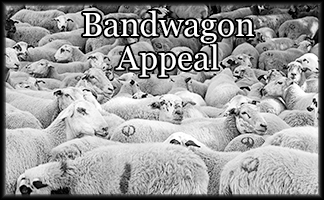
MEANING: An effort is made to influence you to act in a certain way by asserting or implying that that is what is popular or what the majority is doing.
EXAMPLE: "Vote for a winner, Senator Simpkins."
The effectiveness of this appeal stems from the psychological truth that few people are capable of standing on their own two feet or have any deep seated convictions about anything. Generally, as we were told many centuries ago, men are easily blown about by any wind of doctrine. People say to themselves, "If most people believe this way, why should I stick out like a sore 115 thumb?" Human nature likes company. This is as true in matters social, political, and economic, as it is in matters religious. A leader who knows his psychology can easily win the sup-port of those people that find it hard to swim against the current.
A speaker or writer breaks down their resistance by making them feel that they are standing alone. "Everybody is voting Republican; how about you?" The swing is to brand coffee." "Here is a list of those already signed up for." For these individuals the speaker or writer does not need to prove -- if he could -- that he or his product is superior.
Many times this appeal is based on a deception. The speaker or writer is very definitely in the minority, but he hopes to make you think that he or his product is popular. Of course, even if a product is purchased by the majority, that is no indication that it would meet your specific individual needs.
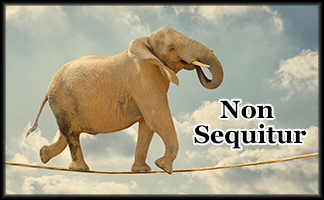
MEANING: The conclusion is not necessitated by the premise(s).
EXAMPLE: "Your children deserve the best milk. Buy Borden's."
Strictly speaking, all fallacies so far covered where the conclusion is invalid are Non Sequiturs. There is, therefore, no one form for a Non Sequitur. In the example cited above no more reason is given to buy Borden's than to buy Sealtest or any one of a hundred other brands of milk. An assumed or unstated premise is: only Borden's is the best milk. But since this premise was not stated, the conclusion is invalid. The premise was not stated because it is so very dubious.
Since the Non Sequitur label can be applied to so many other fallacies, the label will be reserved here for only those invalidities that cannot be classified under some other heading. They are at least Non Sequiturs. And there are a vast number that must be so classified. All simple advertisements of the type, "Your children deserve the best milk: buy Borden's" are cases of non sequiturs. The conclusion does not necessarily follow from the premise.
Practice asking yourself when you read or hear these simple arguments: "What is being assumed, and how dubious is that assumption?" It is no doubt too much to ask of us that every time we assert a conclusion that we state all our premises. We may assume that some will be understood by the audience. But when it comes to our accepting others' arguments, especially where our money is involved, we do well to ask, "What does this argument assume?"
The fallacy depends for its plausibility upon failure to be aware of the leap committed -- jumping without looking, as it were. As a trick, it means bringing in defense of a statement an-other statement which does not in fact prove it, trusting that one's opponent will not challenge the proof. This can often be accomplished by making the supporting statement a reference to a learned theory of which one's opponent will be afraid to confess his ignorance, or making the supporting statement so obscure that one's opponent fears that it would show shameful ignorance if he con-fessed that he did not see the connection. "Heredity has nothing to do with achievement in later life. The well known Ratlow-Borgen study made at the University of Florida was very thorough on this matter." Perhaps it was thorough, but whatever was it and just how does it prove the conclusion?
Don't be afraid to ask people how "B" is supposed to prove "A." This is to admit ignorance or to suggest that you lack logical insight, but too much fear of admitting ignorance lays you open to much crookedness in arguments.

MEANING: Your opponent either (1) restates your position falsely or (2) exaggerates the consequences that may follow from your position.
EXAMPLE: (1) Smith: "I am opposed to capital punishment." Jones: "I'm not." Smith: "You ought to be; capital punishment is unchristian." Jones: "I'm getting tired of people like you who oppose punishing criminals." (2) Smith: "I am opposed to capital punishment." Jones: "You fellows that are against capital punishment must want your daughters molested every time they leave the house."
This fallacy is called Attacking a Straw Man because the perpetrator of the fallacy attacks, metaphorically speaking, a scarecrow or a stuffed man, something easy to demolish but not having the strength of the real position. The fallacy is particularly effective where you lack opportunity to correct the misrepresentation of your position. As has been said before, the average listener or reader is not a very alert or patient listener. In the minds of many such people if the exposition and defense of your position involves extensive qualification and discussion, the outcome may not be clear. Your opponent may choose to describe your stand in a distorted fashion that may readily be destroyed. "Let's consider now my opponent's position," and away he goes into the realm of imagination, stating your position in such a way that it becomes an easy pushover.
Suppose you are campaigning against public slot machine gambling. Your opponent accuses you of intending to prohibit any form of gambling in one's own home, such as card playing for money. Obviously it will be easy for him to refute this oversimplified or exaggerated version of your position. And if you are either too nervous and inexperienced to restate correctly your original position, or you are not present to protect yourself, he will carry the day.
It should not be thought that Attacking a Straw Man necessarily involves restating an opponent's position in a more extreme form. Suppose a man to take the position that "capital punishment laws are never right." A second man argues that capital punishment laws are always right. But to discredit the first, the second says, "My opponent believes that capital punishment would not be right under state laws. What does he mean -- that capital punishment would be right for the federal government but wrong for the state government? This is obviously an arbitrary distinction, for which there can be no basis in fact. It is much more consistent, and, as I shall now show, right to take the position that the present capital punishment laws, state, federal and otherwise, are desirable."
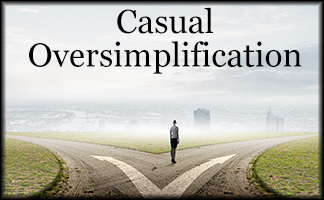
MEANING: A complex event is explained by reference to only one or two probable causes whereas many are responsible.
EXAMPLE: "If it were not for the ammunition makers, we would never have wars."
Causal Oversimplification is the greatest evil of thinking in the area of the social sciences. The human mind grasps quickly at simple solutions of baffling and disturbing problems. "What is the cause of divorce?" Note how the question is put -- as if there were just one cause that explained the whole complex phenomenon. If there were such a cause it would, of course, greatly simplify the handling of the problem. But examination of the scientific literature on divorce (or automobile accidents, etc. ) quickly discloses a great variety of possible causes. Among those of us who are not experts in a given field there is a strong tendency to pick the one cause that suits best one's own interest. Thus prohibitionists blame the mounting number of auto accidents on the consumption of alcoholic beverages, whereas highway engineers place the blame on the public's unwillingness to pay for good roads.

MEANING: To shut off or close the argument a popular maxim or old saying is quoted.
EXAMPLE: Mrs. Jones: "You know, Ann, I think the Browns must be having trouble. The last two mornings I've seen Tom Brown leave the house, slam the door, and drive off in his car looking awfully mad. I'll bet they're headed for a divorce."
Mrs. Smith: "I don't know, Barbara. Really, they've always seemed to be very much in love."
Mrs. Jones: "Well, all I know is that 'where there's smoke, there's fire.'"
Trotting out some popular maxim, proverb, adage, or "wise" saying to end the argument in the quoter's favor is a rather common practice. Some people have a marvelous store of these gems of wisdom; no matter what the emergency they are never caught short without the appropriate pearl. Other people have just a few pet maxims, but apparently these are applicable to the widest variety of situations. The troubled waters of international politics and domestic issues have had all sorts of old sayings tossed into them, but there seems to be no magic in words to still the commotion. Normally no factual proof or logical reasoning is presented to justify the use of the maxim.
Really, if you look hard enough, you will probably find that every maxim has its contradictory, such as: "Look before you leap" and "He who hesitates is lost"; "Two's company, three's a crowd" and "The more, the merrier"; "Absence makes the heart grow fonder" and "Out of sight, out of mind." Thus, if maxims are to settle arguments, they settle none. The arguers could go on till doomsday matching maxim for maxim.
There are four questions that may be asked of every Sophistical Formula introduced into an argument: (1) what does it mean? (2) is it true? (3) is it relevant? (4) what does it prove? Not many proverbs can survive these four tests. No doubt there are times when we should look before we leap. But just as certainly there are times, as when one suddenly realizes that he is in the path of a speeding automobile, that one should leap and then look. Every controversial situation must be settled in its own terms, and not on the merits of some Sophistical Formula.
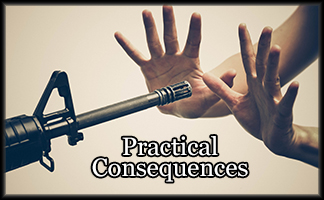
MEANING: An effort is made to persuade us to buy or believe by appealing to our concern for our own individual welfare, i. e. , if we do as we are asked, we will secure certain bene-ficial consequences, while if we refuse to do as asked, the consequences will be harmful. Insofar as we act on such assurances without asking for the proof that the promised benefit or threatened loss will actually ensue or insofar as such appeals are made to us in the hope that we will not objectively examine them, a fallacy is committed.
EXAMPLE: Slip inserted in workers' pay envelopes: "If the Republicans do not win this election, this factory will be forced to close its doors and you will be without a job."
You may be surprised to find Appeal to Practical Consequences among our fallacies. "Isn't it wholly reasonable to act on the basis of foreseen good or bad effects?" you ask.
The vast majority of us are interested in that which is of advantage to our health and com-fort; we're interested in our possessions, our conveniences, our rights and privileges. This is a normal human trait, hardly to be eradicated, and with it I have no quarrel.
But why should we buy or believe simply because someone tells us it is to our advantage? The reasonable thing to do is to make an objective examination of the product or the proposition compared with its alternatives to see whether it is better fitted to be of advantage to us. All too often we blindly follow someone else's confident assurances that such and such consequences will follow.
In the example cited above, the fact of the matter may be that the factory will have to close regardless of who is elected. It is in bad straits financially. Or it may be in no real danger of closing, regardless of the election outcome. Many Appeals to Practical Consequences are just bribes or threats without any foundation in fact.
The Appeal to Practical Consequences, with few exceptions, takes the form of a purely personal appeal to the individual's concern for himself. Such selfish regard has been repudiated long ago by most religious prophets and moral theorists. Furthermore, the appeal is apt to be made on the material level only -- such tangibles as food, shelter, and clothing. Finally, the appeal to consequences by its very nature overlooks any values that may be inherent in or intrinsic to the act. The look to consequences is a look beyond the thing or act itself to what follows in its wake. Conceivably tnere are things which ought to be done -- such as telling the truth or refraining from lying -- even though the consequences are unpleasant. To settle whether or not that is so would involve an excursion into technical philosophy beyond our purpose at this point. It suffices to point out that we do well to ask: What are the consequences to others ? What are the intangible or spiritual consequences? Is this the sort of question that should be settled by consideration of consequences?
The child's mind, it is true, is limited in its consideration of such questions. Nevertheless many parents err in the opposite-direction by making a much too crude appeal to consequences. "If you're good, Mother will buy you a lollypop." But why be good ? There is no real connection between being good and lollypops. "If you don't behave, Dad will give you a good licking when he gets home." But why shouldn't the child do it? Do not let these rewards or punishments be the reason. The result of such a bribery ethics is a child reared to be good so long as evil does not offer a more substantial bribe. It results in the adult who, in a hurry and confronted by a red traffic light, figures the angles. There being no policeman around, what gets him further, stop-ping or going on through? It results in the totalitarian mind, the man who does not mind loss of liberty, so long as he gets what he regards as his share of food, shelter, clothing, and the comforts of life. Children should earlier in life learn the reasons why: in terms of consequences, yes, but not merely their own pain or pleasure; rather, consequences in terms of injury to others and one's own internal loss of self-respect. In the case of so many of us we are good only so long as it is profitable to be so. As long as the penalty is slight, we do it time and again. We do not ask ourselves, why is there a traffic light at this point? A parent who can get his child to behave acceptably only by making him afraid of the punitive consequences of his acts has got the cart before the horse. Fear of punishment may keep a child from wrongdoing for the moment, but later the fear may be connected in his mind only with getting caught doing wrong.
Much advertising and salesmanship, both of goods and of ideas, makes the Appeal to Practical Consequences. Use this soap and you will be more beautiful. Wear this suit and you will get ahead in business. What is there that is not sold by such an appeal? In every case let us ask for the proof that the promised. benefit will actually be delivered.
Capitalizing on fear is the basis of much Appeal to Practical Consequences. Life is full of hazards and some people are timid souls. The salesman may delineate in terrifying detail the dangers of life lived without his product, an elaborate fire alarm system for the home. Whether or not a real hazard exists, we need to ask ourselves, "Why am I buying? because of fear? or 4 because I really need what he is selling and need it now without, examining whether another brand might better serve the purpose?"
A variety of the Appeal to Practical Consequences is the Appeal to Force. In the adult world it is used considerably less than formerly. Yes, we have to use force on occasion; we have to have policemen. An attacked nation feels the necessity of using force to repel the aggressor. 4 But force is never an adequate substitute for rational discussion.
When the Appeal to Force is resorted to in controversial social, political, economic, etc. , issues, it is not commonly done in an open, explicit manner. The use of force to back up the argument and to close it is more or less veiled. It is a threat to knock down the man who differs. "Put up or shut up." "Want to make something of it?"
There are those people who believe that muscle, force, superior power is the only test of truth and right and value. It seems rather crude, yet some few philosophers have argued for it. We can agree that might makes right, but not that might is right. Might makes right in the sense that the victorious party makes or changes the law. But that does not mean that the victorious use of power to attain a position of might justifies the victor's cause.

MEANING: A position is defined in such a way as to exclude all negative cases or adverse evidence.
EXAMPLE: Jones: "Communism cannot help but work."
Smith: "I disagree. Look at Russia; things are in a mess there.
Jones: "Oh, sure, but that's not real communism."
Smith: "Look at China; communism is not working there."
Jones: "They don't have communism there either."
Evidently Jones is defining "communism" as "that political System which cannot help but work." This certainly does not accurately report how most people use the term. Instead of destroying Smith's position by evidence, Jones leaves him no ground for an opposing position and so destroys the argument as a whole. No matter how many failures of communism Smith brought up, it would be to no avail. Jones' position is stated in such a fashion that no evidence can possibly refute it.
In our example, it was not immediately clear that Victory by Definition was being perpetrated. This is often the case. But sometimes the fallacy takes the form of someone's saying, "I maintain that all true Christians are morally superior to the adherents of any other religion." It is a waste of time to argue with him, for he has safeguarded himself at the very start by the use of the word "true." Terms like "real" or "honest to goodness" may be employed in the same manner. If you cite the case of Thwackum, a member of a Christian church, who is a reprobate, you will be told that that is too bad -- that evidently Thwackum is not a true Christian because if he were, then he could not be a reprobate, but only a model of virtue.
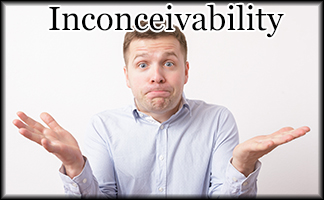
MEANING: You declare a proposition to be false simply because you cannot conceive it actualized or possible of realization.
EXAMPLE: "Since Balihead State has never in all its past history won the conference title, I just can't picture them winning it this year."
The limits of our individual conception do not constitute the limits of reality. Many still refuse to believe the stories about German concentration camps and the equipment used for mass extermination because they cannot conceive (i.e. , they can't picture) men performing such hideous acts. Therefore, such reports must be false.
Pictorial Inconceivability occurs when we declare an idea or belief false because we cannot in our own minds picture or imagine it to be so. Being unable to picture a thing doesn't prove it false._ Not a single social scientist, so far as we know, ever imagined that communism would come first in Russia. We may not be able to conceive a universe that is finite but unbounded, but our inability does not destroy Einstein's theories. Medievals could not think of a ship sailing west on the Atlantic without sooner or later falling off.
A second type of Inconceivability, Experiential, declares a particular idea or belief unsound because all past experience reveals its failure to succeed. "Nobody's ever been able to defy the law of gravity and fly in a heavier than air machine. It can't be done." Therefore, few news-papers sent reporters to Kitty Hawk, North Carolina. While we should be guided by past experience, it is not a final authority. If it were, the Wright Brothers would never have gotten off the ground.
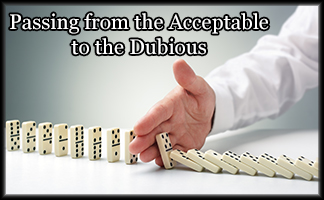
MEANING: The arguer states a series of propositions. The early ones are readily acceptable to the audience or reader, but the later ones are dubious and not proved. The listener or reader is expected to accept blindly the later ones because he has accepted those which came before.
EXAMPLE: Advertisement: "The boys in the service abroad want letters more than gifts. Write frequently because some letters may be lost. Write only good news because there are enough unpleasant things going on over there. Buy and write on Barton's Victory Stationery."
In our example the first three propositions are the bait; the last proposition conceals a hook. Not that Barton's is an inferior product necessarily. The evil is that we have accepted what was said -- not because of its truth but because of the power of suggestion. If we have unhesitatingly accepted several propositions closely following one after the other, that acceptance tends to break down our resistance to a questionable proposition which follows. We have been saying "Yes, Yes, Yes." Now it is so much easier to say "Yes" again without looking to see what we are saying "Yes" to.
Our minds easily slip into habitual lines of thought, and find it pleasant to do so. A public speaker wishing to turn an audience toward accepting some radical proposal would probably not start by bluntly stating it. He would begin his speech by reminding his hearers of what they already know and prize. He might refer to the "glorious institutions of our great country," to the "sound common sense of the American people," and to their "unconquerable spirit." He could count on his audience's assenting to these phrases and others like them with some enthusiasm. The build-up and the softening process completed, the speaker will subtly introduce his own preferred remedy. There will be those in the audience so suggestible that they will go on nodding their heads.
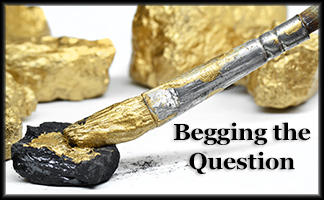
MEANING: The fallacy involves assuming as true what has yet to be proved. Frequently the same proposition is used both as premise and as conclusion in a single argument. This may be done either (1) by the use of synonymous terms or (2) by circular argu-ment, which involves the use of A to prove B and then B to prove A.
EXAMPLE: (1) "Man is a social animal because he is gregarious."
(2) Jones (at the bank): "I would like a loan."
Banker: "What recommendations or references do you have, something to establish that if we loan you the money, you will pay it back?"
Jones: "Well, I can refer you to my friend Quimby; he'll vouch for me. He'll tell you that when I say I'll pay, I will."
Banker: "But we don't know Quimby, so how do we know he can be trusted?"
Jones: "Oh, I can assure you that Quimby can be trusted."
When I explain man's social nature by reference to his gregariousness, I am only repeating myself. No matter how unfamiliar the synonym (we are not apt to be fooled by the use of familiar synonyms), it is no substitute for a reason and provides no evidential proof. The question was not as to what "social" means, but as to why man is social. It would be assumed that the meaning of "social" is known.
A subtle use of Begging the Question often occurs in the court room. Suppose a man is on trial for murder. The prosecutor says to the jury, "This man. must not go unpunished. We cannot allow murderers like him to flaunt the law without paying the penalty." This is to assume what is yet to be proved. The prosecutor must establish to the satisfaction of the jury that the man is guilty as charged, and therefore a murderer. Of course the man must be punished if he is a murderer, but that has not yet been decided.
Not all cases of Begging the Question are so simple as "A is true because A is true." The more elusive cases involve at a minimum two different propositions and take the form, "C is true because B is true and B is true because (we would expect "A is true" but on inspection we find) C is true." This is called Arguing in a Circle. Its persuasiveness is increased in proportion to the number of steps involved. Were someone to argue that "the Bible is true in its every detail be-cause God dictated it and we know that God dictated it because the Bible says that God did," the error should be rather obvious. But if the chain of argument has many links in it before the arguer gets to the point of using his conclusion as premise, we may by that time have forgotten what the conclusion is supposed to be.
The "we" here could be the arguer himself, as well as his audience, for Arguing in a Circle is not necessarily a trick, and just as a man lost in a woods involuntarily travels in circles, so the reasoner may travel through a long circuit of "reasons for reasons" and not perceive that he is back where he started.
Self Deception:
HABITS OF REFLECTIVE PROCEDURE
The mistakes of reasoning that we shall now discuss are called Habits of Reflective Procedure because they originate not in any outer sources, but from within the individual. Instead of someone else's trying to deceive us by skillful argument, we deceive ourselves. How? By bad habits of personal thought and attitude. Few of us ever realize the extent to which our own states of mind or character may hinder or prevent our thinking soundly.
Some of these fallacies are natural predispositions which more or less beset every one. Others reflect differences of mental and/or bodily structure, or are based on education or experience. Rather than treating such characteristics as something wholly foreign to our nature, and therefore capable of being eradicated without trace, they should be recognized as an integral part of our nature and wisely brought under control.
HABITS OF REFLECTIVE PROCEDURE
The mistakes of reasoning that we shall now discuss are called Habits of Reflective Procedure because they originate not in any outer sources, but from within the individual. Instead of someone else's trying to deceive us by skillful argument, we deceive ourselves. How? By bad habits of personal thought and attitude. Few of us ever realize the extent to which our own states of mind or character may hinder or prevent our thinking soundly.
Some of these fallacies are natural predispositions which more or less beset every one. Others reflect differences of mental and/or bodily structure, or are based on education or experience. Rather than treating such characteristics as something wholly foreign to our nature, and therefore capable of being eradicated without trace, they should be recognized as an integral part of our nature and wisely brought under control.
Language:
WATCH THEIR LANGUAGE--AND YOURS TOO
Language is man's finest invention. Without words we would be lost. But sometimes we are lost with them or because of them. Not that the words are at fault. We are the victims of the users of words.
Most words have a variety of meanings. Some words have little if any meaning. There are people who turn this obscurity of language to their advantage and your disadvantage.
People use words for a variety of purposes -- some good, some bad. An understanding of some of these purposes will clarify what may be called the fallacies of language.
1. Language is most commonly used to point as accurately as possible to some thing (or property of a thing or relation between things or between their properties). This we will term the scientific or descriptive use of language. The man who as he looks out the window simply says "Rain" is probably making such a use of language. I say "probably" because only the user himself knows what he purposes. But the word "rain" is usually used for that purpose, and that is all we need to know. The symbols and formulas of mathematics and the sciences are our purest examples of this purpose; they have been devised so as to avoid any implications for human conduct or feeling. "rr2" points to a property of a circle; it does not stir your emotions nor move-your muscles.
2. Language is used to express or arouse emotion. This may be referred to as the emotive use of language. The do-it-yourself home handyman who hits his thumb with a hammer and roars a vivid but unprintable ejaculation is making an emotive use of language. Sermons and orations quite commonly emphasize this use of language. Poems and hymns are excellent examples.
3. Language is used to control or direct conduct. This is the directive use of language. The simple command, "Halt," illustrates this use. Traffic regulations are more extensive examples. Rules and regulations posted in college dormitories are intended as guides to conduct. The overall purpose of advertising is directive: to persuade the reader or hearer to act in a new way or to keep on doing what he is already doing.
4. Language is used to create and maintain harmonious interpersonal relations. This is the social use of language. Ordinary conversation frequently has this purpose -- creating friendliness, pulling people together and holding them together. Formalisms and conventionalities appearing in correspondence, such as "dear sir," illustrate this use of language.
A given body of discourse could involve all four of the above-mentioned uses of language, but the speaker or writer who attempts simultaneously two or more of these uses runs the risk of leaving his hearer or reader in confusion as to what is expected of him. If a person professes to use or is supposed to use language scientifically, but in so doing employs words properly emotional, confusion is likely to result. If a mathematician or physicist broke out into poetry or song when expounding Einstein's theory of relativity or modern nuclear physics, nothing but confusion would result. Similarly we would be left in a state of wonder by a preacher who lectured to us on the principles of quantum mechanics.
WATCH THEIR LANGUAGE--AND YOURS TOO
Language is man's finest invention. Without words we would be lost. But sometimes we are lost with them or because of them. Not that the words are at fault. We are the victims of the users of words.
Most words have a variety of meanings. Some words have little if any meaning. There are people who turn this obscurity of language to their advantage and your disadvantage.
People use words for a variety of purposes -- some good, some bad. An understanding of some of these purposes will clarify what may be called the fallacies of language.
1. Language is most commonly used to point as accurately as possible to some thing (or property of a thing or relation between things or between their properties). This we will term the scientific or descriptive use of language. The man who as he looks out the window simply says "Rain" is probably making such a use of language. I say "probably" because only the user himself knows what he purposes. But the word "rain" is usually used for that purpose, and that is all we need to know. The symbols and formulas of mathematics and the sciences are our purest examples of this purpose; they have been devised so as to avoid any implications for human conduct or feeling. "rr2" points to a property of a circle; it does not stir your emotions nor move-your muscles.
2. Language is used to express or arouse emotion. This may be referred to as the emotive use of language. The do-it-yourself home handyman who hits his thumb with a hammer and roars a vivid but unprintable ejaculation is making an emotive use of language. Sermons and orations quite commonly emphasize this use of language. Poems and hymns are excellent examples.
3. Language is used to control or direct conduct. This is the directive use of language. The simple command, "Halt," illustrates this use. Traffic regulations are more extensive examples. Rules and regulations posted in college dormitories are intended as guides to conduct. The overall purpose of advertising is directive: to persuade the reader or hearer to act in a new way or to keep on doing what he is already doing.
4. Language is used to create and maintain harmonious interpersonal relations. This is the social use of language. Ordinary conversation frequently has this purpose -- creating friendliness, pulling people together and holding them together. Formalisms and conventionalities appearing in correspondence, such as "dear sir," illustrate this use of language.
A given body of discourse could involve all four of the above-mentioned uses of language, but the speaker or writer who attempts simultaneously two or more of these uses runs the risk of leaving his hearer or reader in confusion as to what is expected of him. If a person professes to use or is supposed to use language scientifically, but in so doing employs words properly emotional, confusion is likely to result. If a mathematician or physicist broke out into poetry or song when expounding Einstein's theory of relativity or modern nuclear physics, nothing but confusion would result. Similarly we would be left in a state of wonder by a preacher who lectured to us on the principles of quantum mechanics.
Irrelevance:
HOW SUGGESTIBLE ARE YOU?
All of us are more or less suggestible. The normal person in making a decision as to whether or not to buy or believe something is affected by one or another of several kinds of circumstances that occur at the time of decision but are really irrelevant to the decision. These factors do not say "Buy!" or "Believe!" But they subtly, even subconsciously, predispose one to act in a certain way.
The average person, entering the new doctor's reception room for the first time and finding it clean and furnished in an attractive modern manner, is favorably disposed toward the doctor he has never seen, therefore more inclined than he would be otherwise to believe the doctor's diagnosis and accept his prescription. Were the waitingroom dirty and poorly furnished the normal patient's predisposition would be exactly the opposite. He might even leave without ever seeing the doctor. Yet would anyone in his right mind be so bold as to assert that the condition of the waitingroom is a reliable index of a doctor's professional competence? Grant that the majority of successful physicians maintain attractive reception rooms, how about that minority of quacks and charlatans posing as healers? They know that it is to their interest to maintain rooms that present the appearance of success.
Today's "smart" sales executives lie awake at night devising new ways to exploit your suggestibility. They hope to find some circumstance for which customers of your type have a weakness, a circumstance which the salesman can intimately associate with his product, and thus create in you the will to buy.
HOW SUGGESTIBLE ARE YOU?
All of us are more or less suggestible. The normal person in making a decision as to whether or not to buy or believe something is affected by one or another of several kinds of circumstances that occur at the time of decision but are really irrelevant to the decision. These factors do not say "Buy!" or "Believe!" But they subtly, even subconsciously, predispose one to act in a certain way.
The average person, entering the new doctor's reception room for the first time and finding it clean and furnished in an attractive modern manner, is favorably disposed toward the doctor he has never seen, therefore more inclined than he would be otherwise to believe the doctor's diagnosis and accept his prescription. Were the waitingroom dirty and poorly furnished the normal patient's predisposition would be exactly the opposite. He might even leave without ever seeing the doctor. Yet would anyone in his right mind be so bold as to assert that the condition of the waitingroom is a reliable index of a doctor's professional competence? Grant that the majority of successful physicians maintain attractive reception rooms, how about that minority of quacks and charlatans posing as healers? They know that it is to their interest to maintain rooms that present the appearance of success.
Today's "smart" sales executives lie awake at night devising new ways to exploit your suggestibility. They hope to find some circumstance for which customers of your type have a weakness, a circumstance which the salesman can intimately associate with his product, and thus create in you the will to buy.
Exploitation:
HOW SUGGESTIBLE ARE YOU?
All of us are more or less suggestible. The normal person in making a decision as to whether or not to buy or believe something is affected by one or another of several kinds of circumstances that occur at the time of decision but are really irrelevant to the decision. These factors do not say "Buy!" or "Believe!" But they subtly, even subconsciously, predispose one to act in a certain way.
The average person, entering the new doctor's reception room for the first time and finding it clean and furnished in an attractive modern manner, is favorably disposed toward the doctor he has never seen, therefore more inclined than he would be otherwise to believe the doctor's diagnosis and accept his prescription. Were the waitingroom dirty and poorly furnished the normal patient's predisposition would be exactly the opposite. He might even leave without ever seeing the doctor. Yet would anyone in his right mind be so bold as to assert that the condition of the waitingroom is a reliable index of a doctor's professional competence? Grant that the majority of successful physicians maintain attractive reception rooms, how about that minority of quacks and charlatans posing as healers? They know that it is to their interest to maintain rooms that present the appearance of success.
Today's "smart" sales executives lie awake at night devising new ways to exploit your suggestibility. They hope to find some circumstance for which customers of your type have a weakness, a circumstance which the salesman can intimately associate with his product, and thus create in you the will to buy.
HOW SUGGESTIBLE ARE YOU?
All of us are more or less suggestible. The normal person in making a decision as to whether or not to buy or believe something is affected by one or another of several kinds of circumstances that occur at the time of decision but are really irrelevant to the decision. These factors do not say "Buy!" or "Believe!" But they subtly, even subconsciously, predispose one to act in a certain way.
The average person, entering the new doctor's reception room for the first time and finding it clean and furnished in an attractive modern manner, is favorably disposed toward the doctor he has never seen, therefore more inclined than he would be otherwise to believe the doctor's diagnosis and accept his prescription. Were the waitingroom dirty and poorly furnished the normal patient's predisposition would be exactly the opposite. He might even leave without ever seeing the doctor. Yet would anyone in his right mind be so bold as to assert that the condition of the waitingroom is a reliable index of a doctor's professional competence? Grant that the majority of successful physicians maintain attractive reception rooms, how about that minority of quacks and charlatans posing as healers? They know that it is to their interest to maintain rooms that present the appearance of success.
Today's "smart" sales executives lie awake at night devising new ways to exploit your suggestibility. They hope to find some circumstance for which customers of your type have a weakness, a circumstance which the salesman can intimately associate with his product, and thus create in you the will to buy.
Form:
THE FAULT MAY BE WITH THE FORM
Any particular argument consists of a form and its content. Into any one of the several forms of argument an almost infinite variety of content may be fitted. When I say that "All A is B" and "All B is C," and therefore "All A is C," I am stating one of the forms of argument. The form is given concrete content if for "A," "B," and "C" I substitute some words with real referents, such as "kittens," "cats," and "animals."
Some forms of arguments are considered to be valid forms; other forms, invalid. Notice we say "valid." An argument with a valid form may nonetheless be an unsound argument.
If All kittens are cats and All cats are animals, then All kittens are animals.
This form of argument is valid, since no matter what material be supplied for A, B, and C in the blanks, the premises would necessitate the conclusion. But what if one said that All animals are cats and All cats are kittens, then All animals are kittens?
This argument is just as valid as the former, since the premises do necessitate the conclusion. Our objection is that the argument, however valid, is nevertheless unsound, for its premises are untrue. It is not the case that all animals are cats, nor are all cats kittens; nor does saying so make it true. But saying so does commit us to saying that all animals are kittens. That conclusion is valid.
In this section we will be concerned with invalid arguments, i. e. , with arguments of a faulty form. No matter what the content, the premises do not necessitate the conclusion. The premise or premises may be true; they may be false. That is not the point. The point is: asserting those premises does not compel the listener or reader to accept the conclusion.
THE FAULT MAY BE WITH THE FORM
Any particular argument consists of a form and its content. Into any one of the several forms of argument an almost infinite variety of content may be fitted. When I say that "All A is B" and "All B is C," and therefore "All A is C," I am stating one of the forms of argument. The form is given concrete content if for "A," "B," and "C" I substitute some words with real referents, such as "kittens," "cats," and "animals."
Some forms of arguments are considered to be valid forms; other forms, invalid. Notice we say "valid." An argument with a valid form may nonetheless be an unsound argument.
If All kittens are cats and All cats are animals, then All kittens are animals.
This form of argument is valid, since no matter what material be supplied for A, B, and C in the blanks, the premises would necessitate the conclusion. But what if one said that All animals are cats and All cats are kittens, then All animals are kittens?
This argument is just as valid as the former, since the premises do necessitate the conclusion. Our objection is that the argument, however valid, is nevertheless unsound, for its premises are untrue. It is not the case that all animals are cats, nor are all cats kittens; nor does saying so make it true. But saying so does commit us to saying that all animals are kittens. That conclusion is valid.
In this section we will be concerned with invalid arguments, i. e. , with arguments of a faulty form. No matter what the content, the premises do not necessitate the conclusion. The premise or premises may be true; they may be false. That is not the point. The point is: asserting those premises does not compel the listener or reader to accept the conclusion.
Maneuver:
HOW NOT TO ARGUE
The fallacies in this group are not based on misuse of language. Nor do they depend on circumstances external to the argument. Yet they are powerful deadly weapons and vicious tricks in the hands of skilled disputants when utilized in debates, discussions, speeches, etc. Look for them when reading books and articles of an argumentative nature. You will find them in news-paper editorials; you can discover them in the paid advertisements in newspapers and magazines where the case for this or that politician, this or that side in a strike, is presented. Although the maneuver is obvious if displayed in a simple manner, it may easily be overlooked in the actual course of a lengthy argument.
These fallacies are not confined to the skilled. All of us are prone to use them, especially in situations where we have hastily expressed an opinion on a subject of which we know little; but rather than honestly admit our mistake or doubt, we resolutely stick to that opinion and clutch at any device that seems to give the appearance of truth to our view. So, to the knowledgeable we look like fools, whereas we might have gained their respect.
HOW NOT TO ARGUE
The fallacies in this group are not based on misuse of language. Nor do they depend on circumstances external to the argument. Yet they are powerful deadly weapons and vicious tricks in the hands of skilled disputants when utilized in debates, discussions, speeches, etc. Look for them when reading books and articles of an argumentative nature. You will find them in news-paper editorials; you can discover them in the paid advertisements in newspapers and magazines where the case for this or that politician, this or that side in a strike, is presented. Although the maneuver is obvious if displayed in a simple manner, it may easily be overlooked in the actual course of a lengthy argument.
These fallacies are not confined to the skilled. All of us are prone to use them, especially in situations where we have hastily expressed an opinion on a subject of which we know little; but rather than honestly admit our mistake or doubt, we resolutely stick to that opinion and clutch at any device that seems to give the appearance of truth to our view. So, to the knowledgeable we look like fools, whereas we might have gained their respect.
